2020~2021 News
2022-3-26
The 9th Interactive Seminar of specialized academy of organic chemistry (Suzuki Juku)
As a regular seminar series of Specialized Academy of Organic Chemistry (Suzuki-juku), the ninth interactive seminar was held online with the attendance of 13 participants on March 26, 2022.
Prof. Dr. Ken Ohmori and Dr. Vipul V. Betkekar (Tokyo Institute of Technology)
Title: "The polyphenol world: Total syntheses of structurally complex and unusual natural flavonoids"
Oligomeric proanthocyanidins (OPAs), condensed tannins, constitute a huge natural product library composed of diverse polyphenols. Although potential bioactivities are expected, a majority of compounds are left unexplored, as the natural plant extracts are often intractable mixture of closely-related compounds, rendering isolation difficult even with modern separation techniques.
The talk dealt with the recent progress of polyphenol synthesis by focusing on the flavonoid-sugar analogy, by which the orthogonal synthetic protocol was developed, enabling access to complex oligomers of flavon-polyphenols.
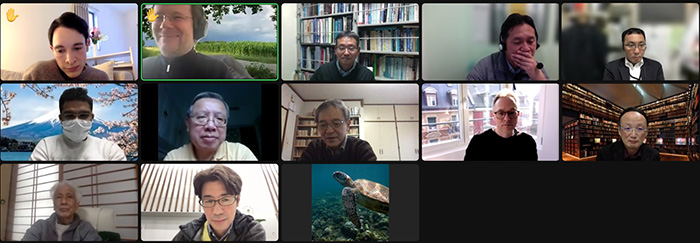
2022-3-25
The Comprehensive Academy Holds a Seminar for all the members of the Academies.
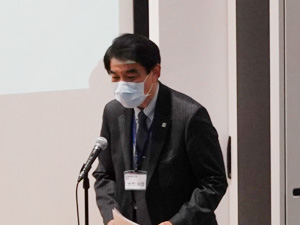
The Organization for Fundamental Research (CFR) was established in 2018 by the Tokyo Institute of Technology (Tokyo Tech) to nurture young researchers who will be responsible for the pioneering science and technologies of tomorrow. We held a seminar for young researchers on Thursday, March 10, 2022 from 3:00 pm to 4:25 pm and Friday, March 11, 2022 from 9:15 am to 0:20 pm at the Lecture Hall, S8 Building in Suzukakedai Campus as well as via online conference system Zoom, due to the serious conditions of the new coronavirus infection. This time, we invited three excellent speakers from inside the university to give important guidance to young researchers, i.e., members of the Academies and graduate students in Human Resource Development Fellowship Program, as they prepare for a career in research.
The seminar began with opening remarks by Dr. Naoto Ohtake, the Headmaster of the Comprehensive Academy, followed by lectures by three speakers, and ended with closing remarks by Dr. Norio Inou, the Associate Director of the Organization. The event was a great success, with more than 100 people in attendance over the course of the event.
Lecture 1. Redefining Science and Engineering. - Expectations for those who Support the Future of Academia –
Provost, Dr. Isao Sato
Dr. Sato graduated from the Mechanical Engineering Department of this university, and after quit of the doctoral program, he became an assistant professor and then an assistant professor before being promoted to a professor. He has specialized in the fields of thermal engineering and energy applications as well as plastic molding. He also has been in charge of university management as a vice president since 2014 and the Provost since 2018, and also serves as the Director of the Laboratory for Design of Social Innovation in Global Networks. Under the title of "Redefining Science and Engineering," the lecture covered a wide range of profound topics, including the achievements of reforms toward the University's vision for the future and the perceptions of the current Executive Board, university management based on investment effectiveness and cost analysis, a management system to keep a positive circle on, investment in human resources that produces returns to society, investment in new research areas, strategies for long-term management, and methods to radically enhance the virtuous circle. He also gave a wonderful message to young researchers: "Let the seeds of interest fly far and wide.”
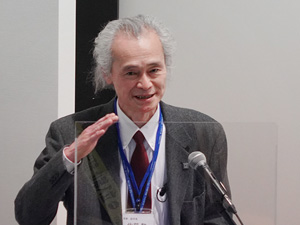
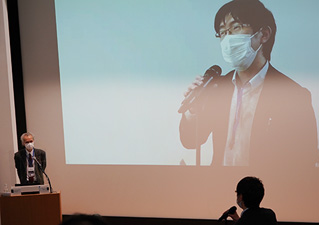
Lecture 2. Pursuing Research and a Happy Life. - From a life that was full of management -
Specially Appointed Professor, Dr. Yuji Kagohashi
Dr. Kagohashi graduated from the Mechanical Engineering Department of this university, and joined Japan Tobacco and Salt Public Corporation (now JT) after completing his master's degree. He worked in the manufacturing division, new business (CEO of a joint venture in restaurant industry), human resources division (responsible for recruiting new employees), and drug discovery business (Senior Managing Director of Torii Pharmaceuticals). He has been appointed as a specially appointed professor at this university since 2015, and has been active in the development of young human resources and industry-academia collaboration at the Engineering Human Resources Development Organization of Tokyo Tech. In this lecture, he described in detail, with actual examples and his own experiences, how a "person who has pursued research" has such characteristics as having no unconscious assumptions, being a good member of society, having imagination, being curious and having a wide range of subjects, having the ability to learn even in different fields, and being respected even abroad. Dr. Kagohashi repeatedly demonstrated through his lecture that it is a good guidepost for young researchers to ask themselves the question; “What is your happy life?”
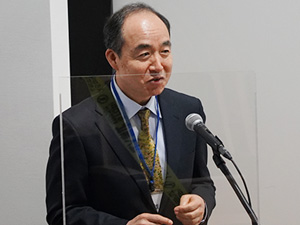
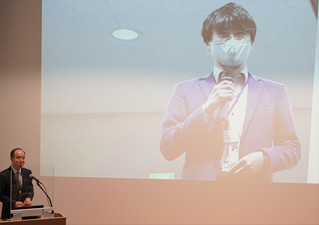
Lecture 3: A Talk about Topics Related to Research
Honorary Professor, Dr. Keisuke Suzuki
Dr. Suzuki graduated from the Faculty of Science at the University of Tokyo, completed his doctoral studies at the same university, and worked as an assistant and associated professor at Keio University before being promoted to professor. He has been appointed a professor at the Faculty of Science of this university since 1996, as well as a member of the Japan Academy since 2018. He retired in 2020, and is now an honorary professor and specially appointed professor of this university. His specialty has been synthetic organic chemistry, and he is also the headmaster of the Specialized Academy for Organic Chemistry of this organization. In this lecture, he gave an entire history of organic chemistry in an easy-to-understand manner for the non-specialist audience, touching on the diversity of life phenomena and its relation to the development of pharmaceuticals and dyes, while also sharing some of his own experiences. He also introduced various anecdotes about his three mentors who had profound influence on him when he was a young researcher. The lecture clearly conveyed his belief that having a solid historical perspective and valuing close personal relationships are the keys to mastering one's work.
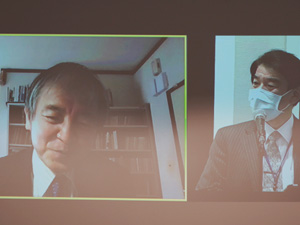
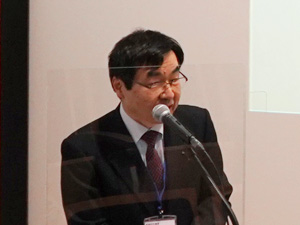
2022-3-25
Annual Research Report Conference and Poster Presentation
The Organization for Fundamental Research (ORF) has been established in 2018 by the Tokyo Institute of Technology (Tokyo Tech) to nurture young researchers who will be responsible for the pioneering science and technologies of tomorrow. Dr. Toru Hisabori, Director of the ORF, presided over the annual research report conference from 1:30 pm to 2:45 pm on Thursday, March 10, 2022 at the Lecture Hall, S8 Building in Suzukakedai Campus as well as via online conference system Zoom, due to the serious conditions of the new coronavirus infection. The conference was attended by 50 people at the Lecture Hall including Dr. Kazuya Masu, President of Tokyo Tech, as well as more than 120 university officials and graduate students in Human Resource Development Fellowship Program through the webinar system.
The conference was moderated by Dr. Norio Inou, Associate Director of the CFR, with opening remarks by Dr. Hisabori, followed by a video message from the guest of honor, Mr. Takakuni Ikeda, Director-General of the Research Promotion Bureau of the Ministry of Education, Culture, Sports, Science and Technology.
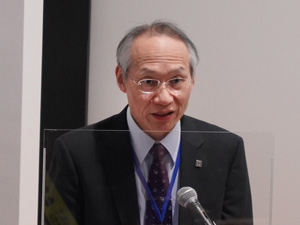
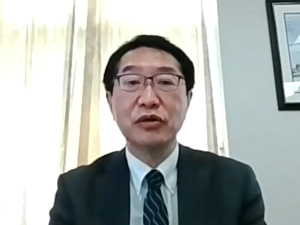
Next, Dr. Ohtake, the headmaster of the Comprehensive Academy talked on the progress and development of the Organization and reported the activities of the Academy in this year.
Progress and Prospects of the Organization
Dr. Naoto Ohtake
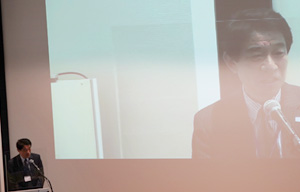
Tokyo Tech has established the Organization for Fundamental Research as a place to foster young researchers in basic science, which was mentioned in the concept of a designated national university. When our honorary professor, Dr. Yoshinori Ohsumi, was awarded the Nobel Prize in 2016, he repeatedly claimed, "I strongly hope that Japanese society will look to the future and recognize science as a culture. Shall we create some kind of system to support young scientists?" The project was planned and founded in response to his appeal. The Specialized Academies, headed by researchers who have distinguished themselves in basic research, have been fostering outstanding researchers by providing an environment in which they can devote themselves to research for about five years. We currently have three Specialized Academies: Cell Science headed by Dr. Yoshinori Ohsumi, Quantum Computing headed by Dr. Hidetoshi Nishimori and Organic Chemistry headed by Dr. Keisuke Suzuki. On the other hand, the comprehensive Academy has provided an opportunity for young faculty members in all fields to deeply explore their own future research themes through a study period of about three months. The role of the Organization, providing an environment that promotes fundamental research based on long-term perspectives and free thinking, becomes increasingly important in the future efforts of our university.
Activities of the Comprehensive Academy
Dr. Naoto Ohtake
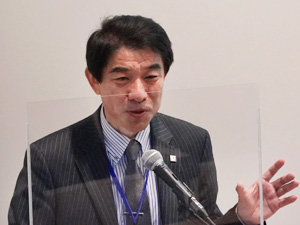
The purpose of the Comprehensive Academy is to make young assistant professors raise their research effort and think deeply about their own themes within a limited period, i.e., three months, of their stay in the Academy. This year, the program was held just once in the third quarter with 21 Academy members due to the corona virus disaster. I would like to express my sincere gratitude to the directors and the administrative staffs of schools for their help in nominating the Academy members. The program for this year consists of 1. Orientation, 2. Individual interview, 3. Introductory presentation of research field, 4. Meeting with Dr. Ohsumi. 5. Workshop "Thinking about the connection between the future society and your own research," 6. Meeting with Dr. Nishimori, and 7. Presentation of future research theme. Although each member vigorously presented a new research proposal developed through the activities of the program, it would be less meaningful if it remained just a proposal. The university kindly provided us with the "New Research Challenge Incentive Fund" this year as well as last two years. Eight individual research projects and eight joint research projects were proposed to the research fund by the members, and all of the proposals have been successfully accepted by the organization and are now being implemented. In an anonymous survey of the students, 90% of the responses were positive, although there was a slight increase in negative feedback this year because the most meetings were held online and there were fewer opportunities for mutual interaction. A comparison of the first- and second-term members' acquisition of Grants-in-Aid for Scientific Research with that of their contemporaries in our university revealed that the ratio researchers who were selected for challenging themes was almost twice as high as that of their contemporaries. In the Comprehensive Academy, we do realize that young researchers are growing up through interaction and awareness with other researchers of the same generation in different fields, and the Academy is surely functioning as a foothold for future collaboration.
Next, three headmasters of Specialized Academy, Dr. Yoshinori Ohsumi (Cell Science), Dr. Hidetoshi Nishimori (Quantum Computing), Dr. Keisuke Suzuki (Organic Chemistry) gave an overview of the annual activities of each Academy.
Activities of the Specialized Academy of Cell Science
Dr. Yoshinori Ohsumi
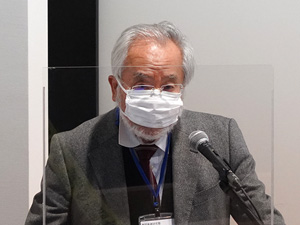
Over the past several years, several ex-members of this Academy have moved out of the university to obtain appropriate permanent positions in Japan and abroad. Members of the Academy received a total of 40 million yen in competitive funding this yea. In addition, 16 academic papers in which young researchers were the first authors have been accepted for the past three years. The activities of this Academy consist of the following four categories.
1. Discussions: Senior faculty members provide messages to young researchers. One session was held this term by Specially Appointed Professor Noda.
2. Colloquium: Inviting lecturers from Japan and abroad to introduce cutting-edge research results. Held 9 times this term.
3. Research funds for members: Effective use of funds for research.
4. Shared laboratories and equipment: Continue to increase shared equipment. Equipment sharing is also underway from each laboratory.
Activities of the Specialized Academy of Quantum Computing
Dr. Hidetoshi Nishimori
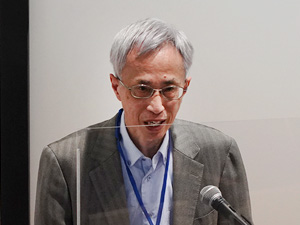
I have run the Academy with a member and a facilitator since last April, although we have many members from inside and outside of the university in my research unit. The results of the laboratory's graduates and current students, such as scientific articles and news of venture business establishments, have been introduced on the university's website and in the mass media. The following two activities are being carried out by our Academy. In addition, we held an online international conference last month.
1. Seminars: A wide range of researchers from Japan and abroad are invited to give presentations. We held three online seminars this term.
2. Research expenses for members: We used the funds to improve the remote work environment this term due to the difficulty of traveling.
Activities of the Specialized Academy of Organic Chemistry
Dr. Keisuke Suzuki
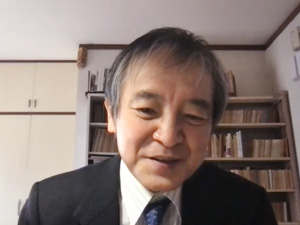
I would like to make this Specialized Academy a salon for synthetic organic chemistry with advisors from inside and outside the university. Since the school has been hit by the COVID-19 at the time of its launch, we are taking advantage of the situation to emphasize human-to-human interaction, mainly through online seminars. The two activities of this Specialized Academy are as follows. I would like to conduct online laboratory visits in the next year.
1. Interactive Seminars: Six online lectures were held by domestic and overseas speakers.
2. Research expenses: Purchase of consumables and participation in academic conferences for the members of the Academy. As it was difficult for them to attend academic conferences this fiscal year, we spent the budget for purchasing consumables.
Then, two ex-members of the Comprehensive Academy gave short presentations on their recent activities.
A Report from Ex-participant of Comprehensive Academy
Dr. Yuno Tanaka
In collaboration with Dr. Yuta Kurashina who is also an ex-member of the Academy, we started a new research project on seawall reconstruction in Okinawa by combining a new solid model creating from a multi-3D printer together with a conventional paper-craft model, and won an award at the DLab Challange from the Laboratory for Design of Social Innovation in Global Network, Tokyo Tech. This activity led to the launch of the Open Frontier Researchers' Network by young researchers inside and outside the university.
A Report from Ex-participant of Comprehensive Academy
Dr. Kengo Arai
Japanese universities face the threat of declining levels in the world, while generation Z is rapidly becoming de-competitive. We independently developed a vision for Tokyo Tech to change the academic game, based on various interviews and discussions with experts inside and outside the university.
Core Values: Leisure and Playing
Purpose: To produce people, ideas, and methods that embody psychology and morality.
Mission: To be the most aspired university for outstanding high school students by 2030
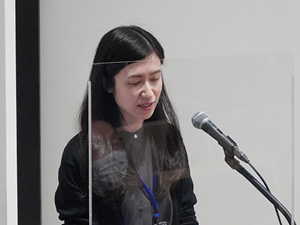
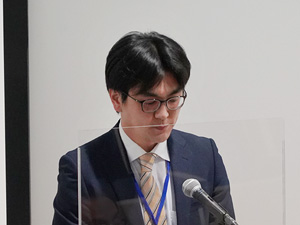
The conference ended with a speech by Dr. Kazuya Masu, President of Tokyo Tech.
Closing Remarks Dr. Kazuya Masu
The spread of the new coronavirus infection across the world has seriously affected the activities of our university, and I know that all of you involved in the organization have made a great deal of efforts. The executive board of the university has been discussing the future plan of the organization on a regular basis, and it has been incorporated into the March 2022 version of the University's Action Package. You will be under tremendous pressure to explore new fields in the future, but I hope that you will not be afraid to take on these challenges. We hope to make this university that can realize such attempts. It is with great regret that we were unable to hold the poster session last year due to the declaration of a state of emergency. I am very excited to hear that today, for the first time in two years, we will have an opportunity to hear directly from you about your daily achievements in poster presentations.
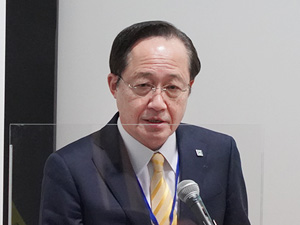
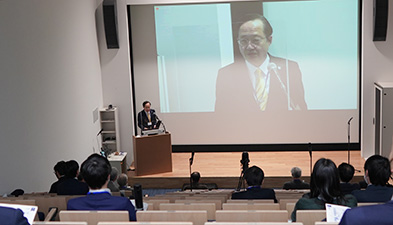
The poster presentation session
The poster presentation session was held on the same day as the report conference, from 4:45 to 6:50 p.m. in Room 105, S1 Building, Suzukakedai Campus. Volunteers from members of the Specialized Academies as well as those attended 1st-term and 2nd term classes of the Comprehensive Academy, and all the members of 3rd-term and 4th-term of the Comprehensive Academy made their posters and gave talks on their recent scientific results. We had 57 poster presentations and about 70 participants. From the viewpoint of preventing the transmission of new coronavirus, the odd and even numbers of posters were displayed next to each other, with the odd-numbered posters being presented during the first hour and the even-numbered posters being presented during the second hour, so as not to crowd the area in front of the posters. Vigorous discussions started immediately after the opening address by Dr. Osamu Watanabe, Executive Director and Vice President of our university, and lasted even after the closing address by Dr. Kazuya Masu, President of the university.
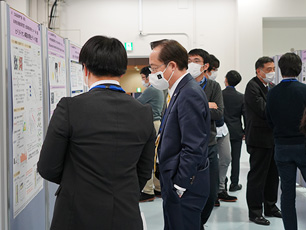
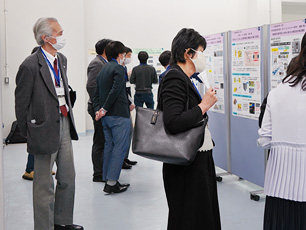
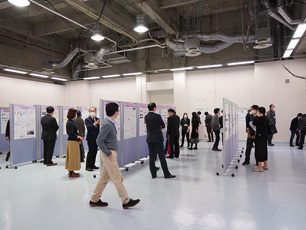
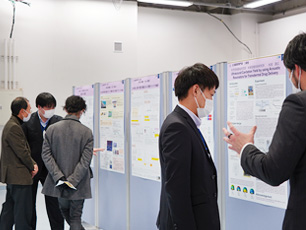
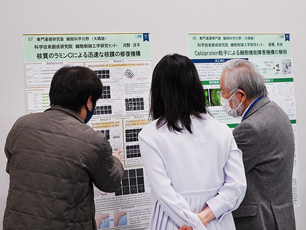
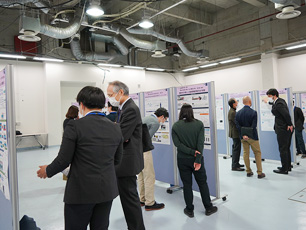
2022-3-18
The Colloquium was held on March 16th, 2022.
This time, the speaker was Dr. Etsuo Susaki (Professor, Graduate School of Pharmaceutical Sciences, Juntendo University).
The title of his talk was "Approach to multicellular systems by organ and whole body scale 3D histology"
Dr. Susaki introduced the cutting-edge method of multicellular system analysis centering on the cell omics framework "CUBIC", which includes the novel method for whole organ staining and imaging "CUBIC-HistoVIsion" and the platform "CUBIC-Atlas" for integrating and quantitatively analyzing a large number of mouse whole brain imaging data. It was a very exciting lecture to teach innovative technology that greatly exceeds the limits of histology. Forty-five people attended the online lecture by Zoom, and there was a lively discussion among the members after the lecture.
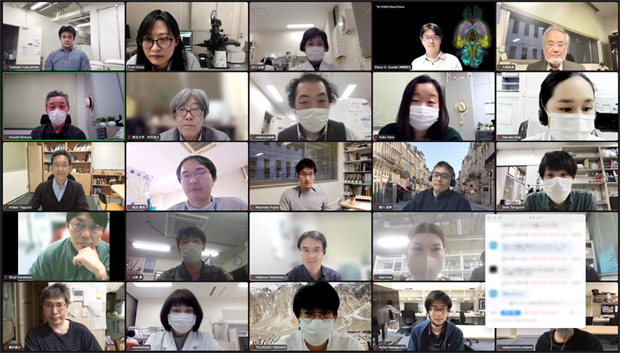
2022-1-21
The Colloquium was held on January 20th.
This time, the speaker was Dr. Mikihiko Naito (Specially Appointed Professor, Graduate School of Pharmaceutical Sciences, The University of Tokyo).
The title of his talk was "Protein degradation technology and drug discovery"
Dr. Naito is one of the developers of protein knockdown technology, which has attracted much attention in recent years. This technology uses compounds to hijack the ubiquitin-proteasome system in the body and specifically degrade target proteins. He spoke extensively about the development history, current status, and prospects of this technology. It is expected to be used in basic research and as a next-generation drug discovery technology. Sixty people attended the lecture, and there was a lively discussion among the students during and after the talk.
2021-12-16
The Colloquium was held on December 14th
This time, the speaker was Dr. Yuichiro Nakajima (Lecturer, Graduate School of Pharmaceutical Sciences, The University of Tokyo).
The title of his talk was "Plasticity of cell fate in the nutritional response of intestinal epithelium"
Dr. Nakajima introduced the latest data showing that the fate of intestinal epithelial cells is regulated by nutritional status in Drosophila. Although it has been known that epithelial cells de-differentiate upon the damage, he showed, for the first time, that nutritional status also triggers de-differentiation and re-differentiation of the intestinal epithelial cells. Forty-four people attended the lecture, and there was a lively discussion among the members during and after the lecture.
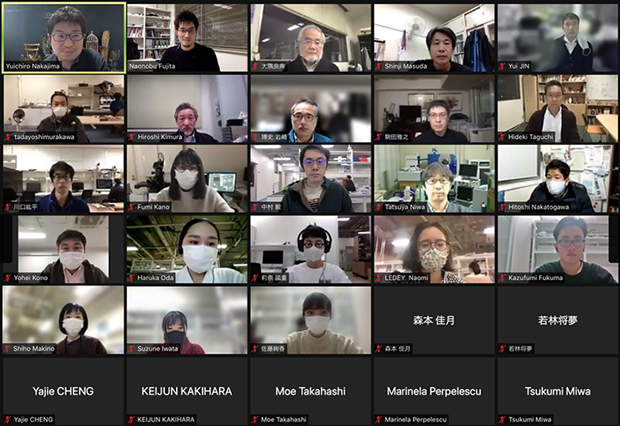
2021-12-14
The 8th Interactive Seminar of specialized academy of organic chemistry (Suzuki Juku)
As a regular seminar series of Specialized Academy of Organic Chemistry (Suzuki-juku), the seventh interactive seminar was held online with the attendance of 14 participants on November 27.
Prof. Dr. Oliver Reiser
(Univ. of Regensburg, Member of this program)
"Breaking all the bonds: Catalytic conversion of furans and pyrroles towards natural product and drug synthesis"
The talk dealt with the catalytic conversion of pyrroles and furans as typical, readily available bulk chemicals derived from non-edible, renewable resources. Focusing on asymmetric transition metal and visible light photoredox catalysis, this recent research enabled development of viable strategies to rapidly convert such starting materials into novel heterocyclic and carbocyclic scaffolds related to natural products or drugs.
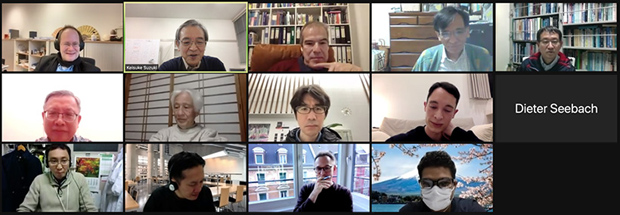
2021-12-2
Appointment of New Academy Scholars
A ceremony was held on December 1, 2021 for the presentation of certificates of appointment for members of the Specialized Academy for Cell Science. Dr. Toru Hisabori, Director of ORF, gave a talk on the role of the Organization for Fundamental Research (CFR), and Dr. Yoshinori Ohsumi, the Headmaster, handed the certificates to the members with words of encouragement.
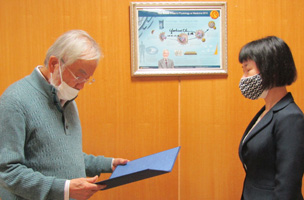
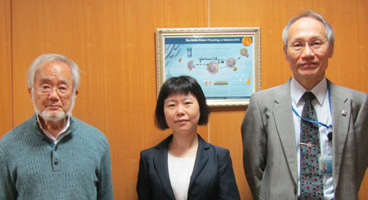
Hold your breath and take off your mask. Say cheese!
2021-11-30
The 7th meeting of the Specialized Academy for Cell Science
The 7th meeting of the Specialized Academy for Cell Science, entitled “My scientific career: a unique journey with few lessons for young researchers” was delivered by Specially Appointed Prof. Masaharu Noda (Homeostatic Mechanism Research Unit, Institute of Innovative Research) on November 22th.
Prof. Masaharu Noda talked about his academic career and his attitudes as a researcher. Although entering the Department of Industrial Chemistry at Kyoto University with the objective of solving pollution problems, he became enamored with the emerging field of molecular biology. He therefore joined the laboratory of Prof. Shosaku Numa at the Graduate School of Medical Chemistry. He performed gene cloning and functional analyses of key molecules in neurobiology, including enkephalin precursor, nicotinic acetylcholine receptor, and sodium channel proteins. Following this, he worked in the laboratory of Prof. Bonhoeffer at the Max Planck Institute for Developmental Biology in Germany, where he conducted neurogenetic research on the region-specific projection of the optic nerve to the optic tectum. After returning to Japan, he continued his work in three areas over the following 27 years: understanding regional specification in the retina (an extension of his prior research conducted abroad), investigation of the receptor-type protein tyrosine phosphatase, and characterization of the Nax channel. At the Tokyo Institute of Technology, he now explores the role of brain function in blood pressure regulation and obesity. When asked how to succeed as a researcher, Dr. Noda said, “Be confident, even without evidence, especially when you are young.” He also added, “put together a strong collection of research papers and grant applications so that readers are impressed by your work,” and “even if research doesn't work out for you, life will go on, so you shouldn't worry about it too much.” He also said that although an unprecedented amount of data and papers are being produced nowadays, he wants to continue his research as long as he can comprehensively understand the latest research, even with the help of computers, and be able to come up with new problem-solving strategies. Although the lecture was held online, his talk was intimate, as if he was talking to each audience member in person. He also shared some witty and amusing stories before concluding that he would be happy to discuss the problems and concerns of young researchers. Despite the title of his lecture, all listeners found Dr. Noda's advice very helpful indeed.
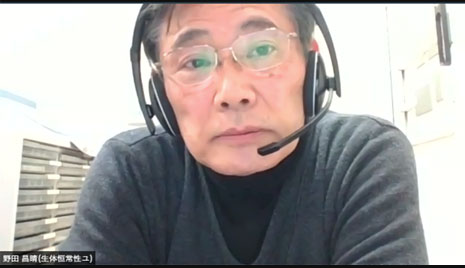
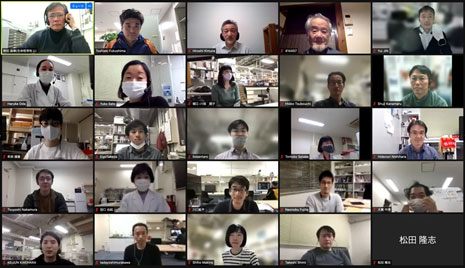
2021-11-26
Final Presentation of 2021 Fourth-Term Comprehensive Academy Member Research Projects
Fifteen academy members participating in the fourth-term comprehensive academy program delivered reflective talks on the impact of the academy on their research on November 11, 2021, from 1:30 p.m. to 4:30 p.m. in the Ferrite Memorial Hall, Centennial Hall Building at Ookayama Campus and on November 22, 2021, from 9:30 a.m. to 16:10 p.m. in the Collaboration Room, Building W9 at Ookayama Campus. This time, we also employed an online conference system in consideration of the preventing COVID-19. Each academy member gave a 10-minute presentation on the research concepts developed during the academy program, and a 10-minute Q&A session followed each presentation. Members were instructed to make their talks as easy to understand for those who were not familiar with their particular specialty. Many presenters described how they had developed on ideas that they formulated during Academy activities, such as those inspired by other members’ research outlined at the "Research Project Introduction" session, those taking on a future-oriented perspective drawing on discussions at the "Connecting Your Research with Tomorrow's Society" session, and those stimulated by advices from Dr. Nishimori and Dr. Ohsumi at the Special Lecture sessions. In addition, there was a proposal for an initiative in which young faculty members gathered to think about the vision of Tokyo Tech. The 94 questions posed during the Q&A session largely reflected the mutual interests developed during the program, and the presenters’ responses showed additional depth and clarity following the three months of reflection and idea exchange. Despite a lot of time ripped into lectures this quarter due to COVID-19, it was clear from the engagement of participants that a strong enthusiasm for integrating different disciplines and proactively adopting new ideas was a key outcome of the comprehensive academy. We hope that the research plans of each academy member will be further refined through discussions with colleagues in their respective fields of expertise, and will come to fruition through collaboration with scientists from diverse backgrounds. After the presentation, a certificate awarding ceremony was held to mark the completion of the formal element of the third-term program.
The Comprehensive Academy has started accepting applications for the "New Research Challenge Incentive Grant" to support the challenge of new research themes set by the academy members. This grant has been established since last year by the worm support of the executive office of the university with the financial resources of the National University Reform initiative and Strengthening Grant. We hope that all of the academy members will submit proposals for challenging research themes that they have developed from the activities of the Comprehensive Academy. After the evaluation by the faculty members in charge of the Comprehensive Academy, the projects to be adopted will be decided in November, and the research funds will be available in December.

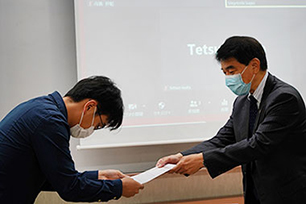
2021-11-26
Comprehensive Academy Class of 2021 Special Event: Getting to Know Prof. Ohsumi
The Comprehensive Academy held a special lecture, "Getting to Know Prof. Ohsumi" on November 9, 2021, from 3:00 pm to 5:30 pm. The special event program provides young researchers with an opportunity to hear from a world-renowned scientist about his or her own life and research history, the scientist's advice for young researchers, and other topics that are not usually available at a conventional talk session.
We invited Professor Emeritus Yoshinori Ohsumi, who was awarded the Nobel Prize in Physiology or Medicine in 2016 and has been the headmaster of the Specialized Academy on Cell Science, to deliver the lecture. In this Special Lecture, we had 19 participants, 18 academy members of Class of 2021 as well as a member of Class of 2020 who missed the Dr. Ohsumi's seminar last year. The participants were seated at sufficient intervals with masks on as the coronavirus infection was not under control yet. In his talk, Dr. Ohsumi provided an engaging outline of his career as well as the importance of basic research, the situation of academia in Japan and expectations for young scientists that included a wealth of valuable information for budding researchers.

This time, Dr. Ohjsumi proposed to take time to exchange opinions with the Academy members, and a question and answer session was held in the form of free discussion. This was a valuable opportunity to share some of the concerns and questions that young researchers have, which are rarely discussed. A part of the discussion is shown below. Please note that "O" refers to the opinions of Professor Ohsumi and "M" refers to the comments of the Academy members.
- O: When you visit foreign universities, you have many opportunities to engage in free discussions with students from diverse backgrounds, but such opportunities are rare at Japanese universities. The participants of this academy are active in a wide variety of special research fields, and it is a precious opportunity to realize such a wide range of interdisciplinary relationships.
When I was a young researcher, I regarded the master's program as a preliminary step to the doctoral program. At present, the number of doctoral students has decreased, making it difficult to accumulate know-how in the laboratory. I am concerned that the quality of graduate schools will decline unless society becomes more aware of the importance of Ph.D. - M: In Japan, the social value of a doctoral degree is declining, which is why people quit after a master's degree. Is the doctorate unattractive? Or is the doctorate not needed?
- M: To be honest, it is too tough for a small number of faculty members to supervise a large number of undergraduate and graduate students. This situation has been going on for a long time, but I still feel that there is no answer on how faculty should deal with it.
- O: Through the activities of the Ohsumi Foundation for Basic Science, I have had many opportunities to talk with corporate leaders. I feel that there are many corporate leaders who are interested in hiring Ph.D. holders. They are expecting Ph.D. holders in order to create the next generation of commercial products, as Ph.D. holders have the ability to think for themselves. In other countries, a doctorate has long been an essential qualification for research and development, even in the industry.
- M: I wonder if master's students are not well informed of such a story, i.e., the importance of Ph.D. even in Japanese industries. I myself have never been envied by others for having a doctorate. I have also never heard that top executives of companies are looking for PhD holders.
- O: We need to tell them more. The top management of companies have realized that leaving as a master's student without the important training to become a researcher will lead to a difficult situation later on.
- M: It is a fact that even if you try challenging research from which you won't publish few papers and get few external funds, you will have a difficult situation when you find the next position in academia. You have no choice to focus on results when you have a fixed term appointment.
- M: If the salary is low and finding a job is difficult, I don't know what I'm going to do for research.
- M: Doesn't it matter if you're doing research you like?
- M: It has been two years since I became an assistant professor and experienced pregnancy, childbirth and childcare. I started to worry about my remaining term. If the government is going to make a call to value young researchers, I would like them to do something about the tenure system.
- M: Although we have a system to extend one's term of office due to childbirth or nursing care, in effect, one's mind would move in the direction of giving up one's career.
- M: When you work at the same job for a long time, your ideas tend to become fixed. I have come to think that the perspective of how to move on to the next position is more important than the term of office.
- M: What about the issue of the appointment of young researchers overseas?
- O: The term of office for postdoctoral fellows is tough overseas, and even if you can become a faculty member, it is tough to get tenure. There are many opportunities to move to companies in the U.S., and the salary is even higher.
- M: I have to think that I have no choice but to do the research I like after I get tenure.
- M: Although both Japan and other countries have their own circumstances, the issue of term of appointment exists. It is true that the fixed-term appointment is a big risk for individuals, but changing the system alone will not solve the problem.
- M: I am a bachelor, so as long as I am able to do the research I like, I think I am fine for the time being.
- M: I have a wife and a child, and I have been doing the research I like. However, when I look around, I feel that my salary is low. Perhaps I should assert my rights more.
- M: The idea that "all I need is to be able to do my research I want" may be the one of the reasons why fewer people are going to enter doctoral programs. If we are creating such a situation, we should think and express what we should do, shouldn't we? But I can't say such a thing in public...
- O: It is only among friends that we can honestly discuss our opinions. It is very important to have friends. The problem of the fixed-term of appointment in Japanese Academia has become a target therapy. In the past, the government launched a plan to increase the number of postdocs to 100,000, but there was no plan for what to do after the number of postdocs increased. Many people who became PhDs in that era were in very tough situations when they were in their 30s and 40s, but many of them are now in their 50s and doing good work because of their experiences.
- M: It depends on the attitude of the research supervisor(PI) whether young people can do research freely or not. If it is going to be an intergenerational competition, I would like the government to set up a system that provides more incentives for young people.
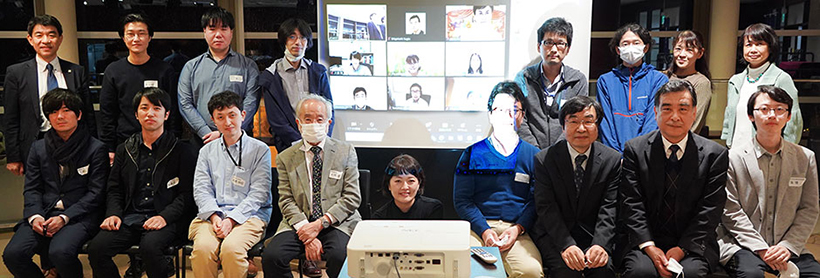
2021-11-16
The Colloquium was held on November 9th.
This time, the speaker was Dr.Damien Hall(Assistant Professor, WPI Nano Life Science Institute, Kanazawa University)
The title of his talk was "New biological concepts from multi-scale biophysical simulations"
Dr. Hall has been working on protein folding, chaperones, amyloid, etc. for a long time using biophysical approaches (both experimental and simulation), and he presented his latest results. The lecture was attended by 41 people, with participants actively taking part in discussions both during and after the lecture.
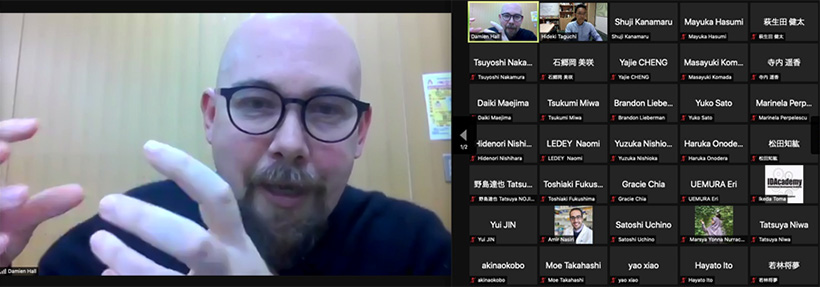
2021-11-16
The 7th Interactive Seminar of specialized academy of organic chemistry (Suzuki Juku)
As a regular seminar series of Specialized Academy of Organic Chemistry (Suzuki-juku), the seventh interactive seminar was held online with the attendance of 14 participants on October 30.
Dr. Catti Lorenzo
(Tokyo Institute of Technology, Assistant Professor, Member of this program)
"Organic Synthesis from the Viewpoint of a Supramolecular Chemist: Construction, Assembly and Application of Programmed Molecules"
The talk dealt with molecular building blocks capable of self-assembly into functional "nanoflasks". The first part highlighted the research on supramolecular catalysis (terpene cyclizations, carbonyl-olefin metathesis etc.) using the hydrogen-bonded resorcin[4]arene hexamer. Synthetic pursuit to derivatives of higher catalyst activity was presented. In the second part, light-induced guest release from self-assembled polyaromatic micelles was discussed.
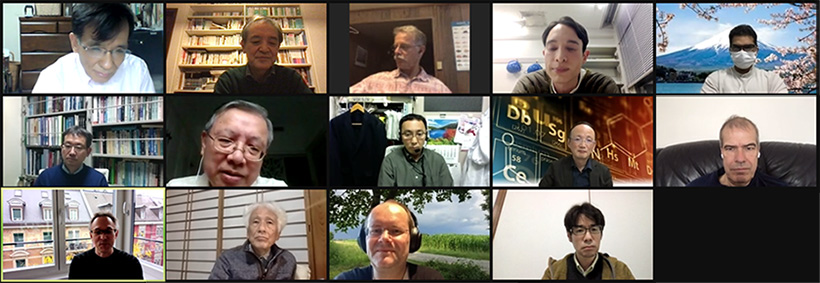
2021-11-2
The Colloquium was held on October 11th.
This time, the speaker was Dr. Nobuyasu Koga (Associate Professor, Institute for Molecular Science, National Institutes of Natural Sciences).
The title of his talk was "Identifying novel protein sequence spaces using rational design".
In this colloquium, Dr. Koga talked about the current state and future prospects of the field of de novo protein design, an area in which remarkable progress has been made in recent years. His engaging and informative talk outlined methods for the design of novel proteins from scratch, including the core amino acid backbone, as well as approaches employed to search for novel protein sequence spaces using such design strategies. The lecture was attended by 117 people, with participants actively taking part in discussions both during and after the lecture.
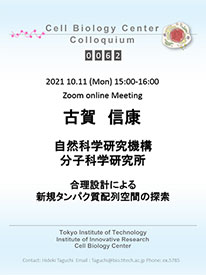
2021-10-28
“Connecting Your Research with Tomorrow’s Society" workshop held for the Fourth-term 2021 Comprehensive Academy Members.
The “Connecting Your Research with Tomorrow’s Society" workshop was held on Thursday, October 25, 2021, from 1:30 p.m. to 5:00 p.m., in collaboration with the Laboratory for Design of Social Innovation in Global Networks (D-Lab) and the Organization for Fundamental Research. This year too, we employed an online conference system Zoom and a virtual sticky note system MIRO to avoid coronavirus infection. This workshop aims to provide academy members with an opportunity to step back and conduct a broad overview of their research project, thereby encouraging a new awareness of the connection between their own research and the future needs of society, and re-build the future scenario. The session enhanced the ability of participants to incorporate a macroscopic perspective when thinking about research while also enhancing collaboration and communication skills.
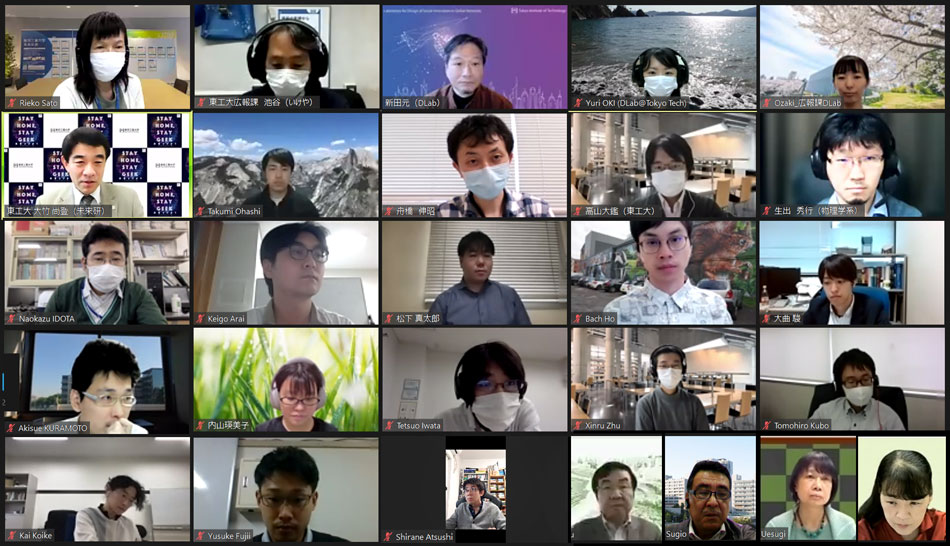
The workshop commenced with opening remarks delivered by Prof. Ohtake, Headmaster of the Comprehensive Academy, who explained the significance and broad objectives of the workshop. Dr. Hajime Nitta of D-Lab then gave a detailed introduction to the workshop program. The 19 participating academy members (17 out of 21 members of Class of 2021 and two former members who were unable to attend the seminar last year) were divided into five groups. As an ice-break, each participant made one-minute self-introduction. And the group members gave a name of the group and shared the contents of their homework, lists of reasons “why a future scenario, “Complete Life at Home”, was achieved”, which were given by Dr. Nitta a few days before the workshop. All the participants then got together and representatives of each group talked about what they had shared in each group.
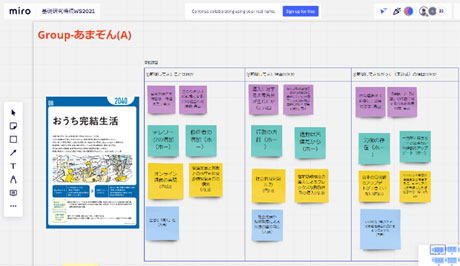
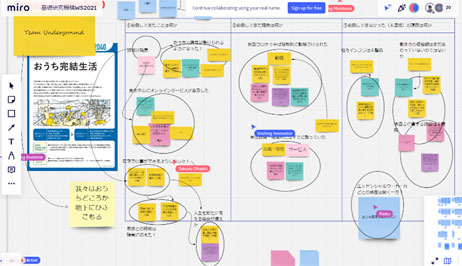
In the actual first phase of the group work, each participant proposed up to five “current issues” to be solved for the future scenario "Freely Create and Choose a Community", shared the ideas and classified the issues to focus on a couple of them as a group with KJ method. In the second phase of the group work, each group discussed the issues to create a network of new solutions as products or services in the future. The focus here was on open-ended discussion with no cost or time limits. The participants were also requested to add at least one solution related to their own research, as well as solutions based on not only science and technology but also on social systems and values. They then reconstructed the future scenario of what the future would be if these issues were realized, based on the information organized above. At the end of the session, representatives of each group presented details of their new solutions and the revised scenario, and engaged in a question and answer session and an exchange of ideas.
The members were not been informed of the workshop content until the day, and some were initially challenged by the structure of the session. However, as the discussion begun and interesting ideas were exchanged, the tone of the session became remarkably positive. During the final presentation session, the Q&A session was lively and participants engaged in a robust exchange of ideas, as we have come to expect of academy members. Although social event after the workshop would be a great opportunity to develop personal relationship, but it was a regret for the organizer that we could not hold it due to the Corona virus environment. We do hope it would be arranged some day in the near future.
2021-10-22
Comprehensive Academy Class of 2021 Special Event: Getting to Know Prof. Nishimori.
The Comprehensive Academy held an online special lecture, “Getting to Know Prof. Nishimori” on October 18, 2021, from 3:00 pm to 5:00 pm. The special event program provides young researchers with an opportunity to hear from a world-renowned scientist about his or her own life and research history, the scientist’s advice for young researchers, and other topics that are not usually available at a conventional talk session.
This time, we invited Professor Emeritus Hidetoshi Nishimori, who has been the headmaster of the Specialized Academy on Quantum Computing, to deliver the lecture. 14 out of 21 academy members of Class of 2021 and two former members who were unable to attend the seminar last year participated in this Special Lecture, except for seven who were unable to attend due to unavoidable reasons. In his talk, Dr. Nishimori provided an engaging outline of his career that included a wealth of valuable information for budding researchers. During the Q&A session after the talk, Dr. Nishimori took time to answer all of the many and various questions from academy members one by one, with his advice leaving a lasting impression.
The followings are some of the questions and answers.
- Q: Where does the curiosity for research come from?
- A: Since I was in the theoretical field, I received stimulation and hints from conversations with others, but most of my curiosity for research came from within myself. However, I don't think this is the case in engineering or experimental fields.
- Q: What is the best way to appeal to the general public so that they can understand the significance of your research?
- A: If you explain the fascination up front rather than the significance of the research, the significance will be conveyed as a result. I think it is important to talk about your internal motivation, because you cannot control whether your research will be useful to the world or not. I think that being conscious of the impact on society does not affect your basic research in a negative way.
- Q: How do you guide students who are not good at writing a report in a logical way?
- A: I used to comment thoroughly on the unclear points in their papers and repeatedly let them think by themselves without giving specific suggestions for revision. I also gave strict instructions not to accept papers if they were late for the deadline. However, today, this could be considered harassment, so be careful.
- Q: What should Japanese universities do in order to conduct basic research that will revolutionize society in 10 to 20 years?
- A: In recent years, the Japanese government has established the "quantum strategy" and has set up a massive budget. However, the government seems to think that all it has to do is to give money to a few largescale research institutes. Unless universities conduct human resource education and advanced research at the same time, it is difficult to expect quality improvement. A certain Chinese research institute had made dramatic changes in their organization by dismissing many traditional researchers and recruiting many talented people from the West as the heads. The reconstruction led them an apparent success at least in terms of the number of papers and the accumulated funds. In the U.S., there is also vigorous promotion of human resources. In Japan, on the other hand, there is little such movement.
- Q: It is said that the research environment in Japan is deteriorating, but what is the difference between before and now?
- A: As far as my own surroundings are concerned, it used to be enough for former professors to perform two duties: education and research. Today, in addition to the above, there is an increase in short-term research and educational programs to obtain external research funds, and there is more time to spend on decision-making and management tasks within universities. You should devote yourself to research that you find interesting while you are young. Think it's fun to be involved in something you like even if it's hard to do, or you will feel stuck.
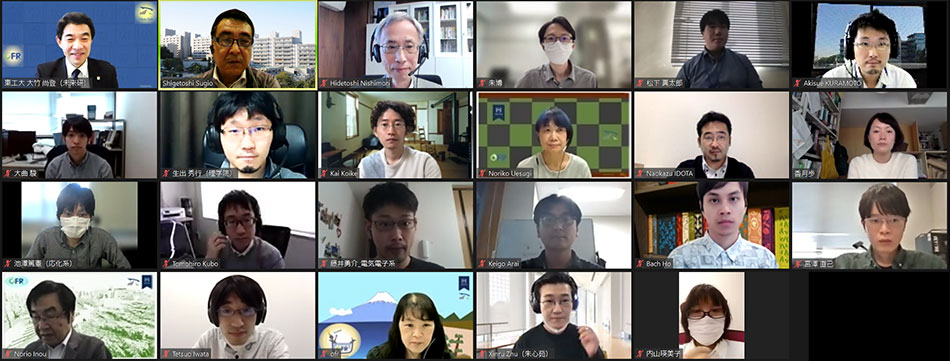
2021-10-20
Researcher Presentations for the Fourth-term Comprehensive Academy Class of 2021
On October 13, 2020, from 13:30 am to 4:40 pm and October 14 from 9:30 am to 3:20 pm, 21 academy members in the fourth-term class of 2021 were invited to give presentations on their research fields via an on-line conference system. Each academy member had 20 minutes to give a 7-minute talk about his or her work to attendees unfamiliar with their field of research, followed by a question-and-answer session.. Interdisciplinary communication is difficult for speakers as it can be challenging to introduce research interests and opinions to a non-specialist audience. The audience, too, must engage with and understand the speaker's thoughts and specialist knowledge before they are able to voice an opinion about the work. Thanks to the careful preparation of speakers and engagement of all members as an audience, a total of 70 questions and answers were actively debated, in spite of the ongoing COVID-19 pandemic, and members were able to share their valuable experiences, often from a unique and valuable perspective, with each other. Another important outcome of the meeting was to create an interdisciplinary space for young researchers to get together and discuss research and the future of the university.
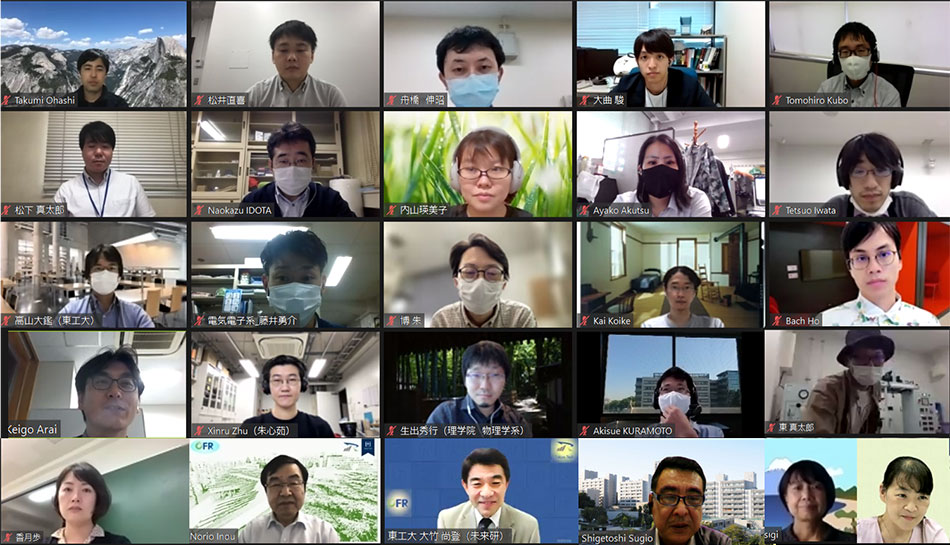
2021-10-18
The 6th Interactive Seminar of specialized academy of organic chemistry (Suzuki Juku)
As a regular seminar series of Specialized Academy of Organic Chemistry (Suzuki-juku), the sixth interactive seminar was held online with the attendance of 13 participants on September 25.
Prof. Kohtaro Osakada
(Tokyo Institute of Technology, Professor Emeritus, Facilitator of this program)
"Elucidation of transmetalation mechanisms of Semmelhack reaction and Suzuki-Miyaura coupling. Is it so creative?"
Recent advance of organic/polymer synthesis was largely supported by the remarkable progress of transition-metal catalyzed cross-coupling reactions. This seminar reviewed the history of cross-coupling reactions, referring to three early contributions in the 1960's. The first one was by Semmelhack at Princeton, while the other two were from our campus. The late Professor Akio Yamamoto elucidated the transmetalation mechanism through the first synthesis of nickel dialkyl complexes, and the late Prof. Takakazu Yamamoto initiated exploiting the process to conducting polymer synthesis. Current status and the future outlook were also discussed.

2021-10-1
Orientation for the Comprehensive Academy’s Fourth-term Class of 2021.
Orientation sessions for fourth-term academy members of the class of 2021 were held on October 1, 2021 via online. Of the 21 academy members, 17 attended the online session. Although the meeting was originally held at the Collaboration Room, West 9 Building, Ookayama Campus together with online, we changed the format of the meeting entirely online to avoid direct impact by Typhoon No. 16, and an admission certificate will be given to each academy member in the individual interview. The orientation program included the following activities:
- -An explanation of the agenda by Associate Director Inou
- -An outline of the purpose and activities of the Comprehensive Academy by Headmaster Ohtake
- -Self-introductions by the staff of the academy
- -A self-introduction session for all academy members
- -The presentation of admission certificates by Headmaster Ohtake Signing of a pledge
- -A talk about effective presentation methods by Associate Director Inou
- -An introduction to academy events held outside the training period
- -A Q&A session
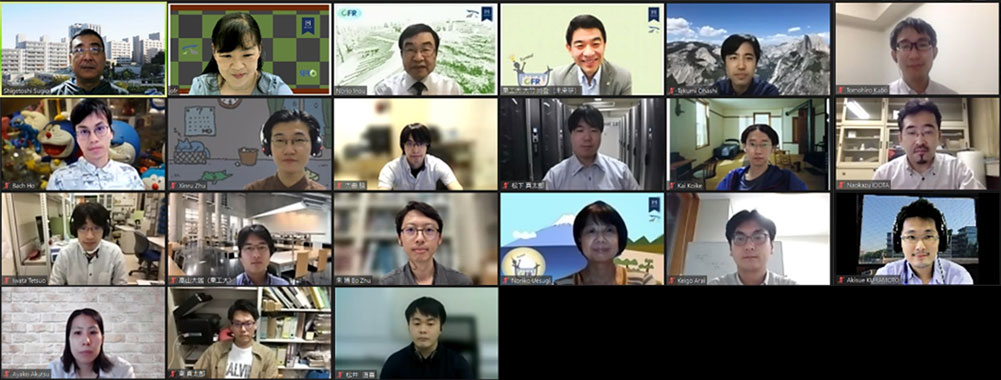
Headmaster Ohtake delivered a talk that described the background to the Comprehensive Academy:
I would like to explain why Tokyo Tech has established the Comprehensive Academy and why you have been chosen to participate in this program. Tokyo Tech has been selected as a designated national university corporation in reflection of its core role in education and research, as well as its large contribution to society. Our goals for research are to strengthen governance, introduce research funds from outside the university, and ultimately to return funding to basic research. We have also identified three priority areas and three strategic areas that we aim to enhance as Tokyo Tech's key strengths, and further we have established the Laboratory for Design of Social Innovation in Global Networks to facilitate the integration of scientific and technological advances into society. As an element of these broader movements, the Organization for Fundamental Research (CFR) was formed to foster early-career scientists who will be active at the forefront of the global research. In addition, it must be important for academic researchers to take immediate action to respond to enormous social impacts of the COVID-19 that has been sweeping across the world since this spring. We launched the “Research Project for Overcoming Coronavirus Disasters” last June in the Institute of Innovative Research and are inviting faculty members of other schools of Tokyo Tech to participate in this project.
A survey by the Ministry of Education, Culture, Sports, Science and Technology (MEXT) in 2014 reported that assistant professors in Japan are only able to devote 60% of their time to research activities. In order to increase this number to 90%, the Specialized Academies are investing in people, funding, and facilities so that members can immerse themselves in basic research. The Comprehensive Academy is a short-term, three-month program that we also hope provides an opportunity for you to devote 90% of you time to seriously consider your future research directions. For this reason, we have decided to keep the activities of the Comprehensive Academy to a minimum and give you space for intellectual creativity. We strongly encourage you to participate in activities of the Academy, which have been designed to facilitate reflection on research questions.
I would like to mention two most important activities during your time at the Academy. First, you must spend a lot of time thinking about your own research theme for the next 10 years and give a presentation about your theme at the research theme setting presentation. Secondly, it is also important to build a human network for future research. The former members of the Academy have been continuing to hold exchange meetings after they complete the program of the Academy, and some of them have started joint research projects that combine different fields of study, taking advantage of each other's strengths to obtain competitive funding. From the point of view of fostering young researchers, we will include the number of papers published and other data in the ongoing survey. We believe, however, it is further important for young researchers to tackle challenging research subjects and to take on the challenge of different fields.
I and all the staff will support you over the coming three months of this enjoyable program so that you can think about your future research themes. Please take pride in being a member of the Comprehensive Academy and work hard to improve your skills.
2021-9-2
The 5th Interactive Seminar of specialized academy of organic chemistry (Suzuki Juku)
As a regular seminar series of Specialized Academy of Organic Chemistry (Suzuki-juku), the fifth interactive seminar was held online with the attendance of 14 participants on August 28.
The presenter was
Prof. Dr. Toshio Nishikawa (Nagoya University),
"Toward Collective Synthesis of Hawaiian Marine Natural Products"
The research is directed to the development of collective synthetic routes to the oscillatoxin–aplysiatoxin class anticancer natural products isolated from Hawaiian marine creatures. The aims are to gain insight into their biosynthetic pathway, and also to have opportunity of drug discovery from the synthetic library.

2021-8-27
The 4th Interactive Seminar of specialized academy of organic chemistry (Suzuki Juku)
As a regular seminar series of Specialized Academy of Organic Chemistry (Suzuki-juku), the fourth interactive seminar was held online with the attendance of many participants on July 24.
The presenter was
Prof. Dr. Lukas Hintermann, (TU Münich, an International advisor),
with the seminar title of
"The Complexity of Catalyst Systems for Selective Organic Synthesis"
Associated with SDGs, one of the goals in the contemporary organic synthesis is “From Stoichiometric Reactions to Catalytic Reactions”. Prof. Hintermann presented the problem citation and the potential solutions to the issues, centering attention to various facets of catalyst design and tuning the multiple reaction parameters, leading to the discovery of efficient catalysts.

2021-8-25
Research by Bando, a former Academy Scholar was featured in Tokyo Tech News.
2021-7-28
Appointment of New Academy Scholars
Asst. Prof. Lorenzo Catti was inducted as an academy scholar into the Specialized Academy for Organic Chemistry of the Organization for Fundamental Research on the 1st of July. Asst. Prof. Lorenzo Catti received his certification of induction from Academy Head Keisuke Suzuki.
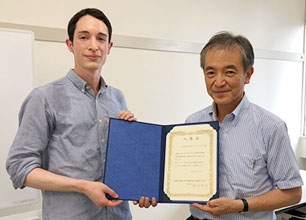
Asst. Prof. Lorenzo Catti
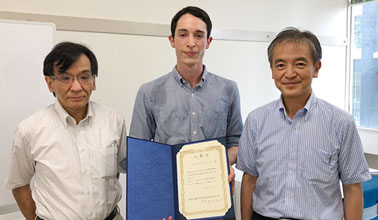
Hold your breath and take off your mask. Say cheese!
2021-7-6
Appointment of New Academy Scholars
A ceremony was held on July 1, 2021 for the presentation of certificates of appointment for members of the Specialized Academy for Cell Science. Dr. Toru Hisabori, Director of ORF, gave a talk on the role of the Organization for Fundamental Research (CFR), and Dr. Yoshinori Ohsumi, the Headmaster, handed the certificates to the members with words of encouragement.
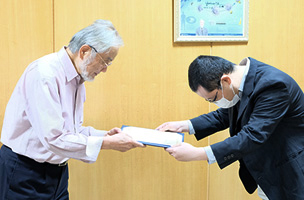
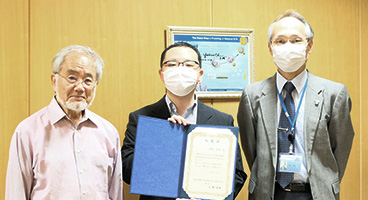
Tatsuya NOJIMA , Specially Appointed Assistant Professor
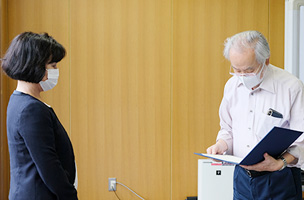
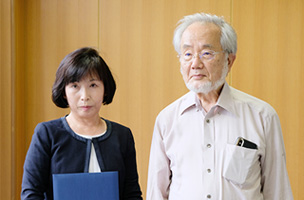
Yuki TAGUCHI , Specially Appointed Assistant Professor
Hold your breath and take off your mask. Say cheese!
2021-6-26
The 3rd Interactive Seminar of specialized academy of organic chemistry (Suzuki Juku)
Specialized Academy of Organic Chemistry (Suzuki-juku,) has started a regular seminar series, once a month from June. On June 26, the third interactive seminar was held online with the attendance of three international advisors, Emeritus Prof. Biing-Jiun Uang (NTHU, Taiwan), Prof. Lukas Hintermann (Technical Univ. Münich, Germany), and Prof. Oliver Reiser, Univ. Regensburg, Germany). Two members made presentations
- Dr. Ando
”Photoredox reaction of naphthoquinones: Total synthesis of spiroxins” - Dr. Pradipta
“Reactivity of acrolein released from cancer cells: Application for selective cancer therapy and diagnosis”
Active discussions were made, including the questions and comments from scientists from different backgrounds, which may have provided the presenters and other participants a good opportunity to come up with new ideas and inspirations.
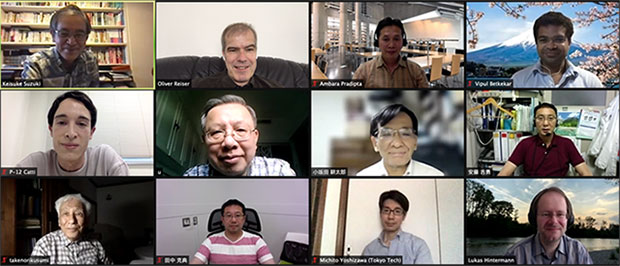
2021-6-8
TokyoTechNews:Yoshio Ando and Akinori Yamasaki received Seiichi Tejima Research Award for FY 2020 (Division of Seiichi Tejima Paper Award)
Assistant Professor Yoshio Ando (Specialized Academy for Organic Chemistry)
Article title:Total Synthesis of Actinorhodin
Actinorhodin is an antibiotic with a characteristic red color, representing the metabolites of type-II polyketide biosynthetic pathway. Although isolated over 70 years ago and having appeared in many textbooks as a classic natural product, the chemical synthesis of this compound had remained unachieved due to formidable synthetic challenges posed by its unique C2-symmetric dimeric structure of pyranonaphthoquinone. The report in Angewandte Chemie International Edition had considerable resonance, recording a top-10% download in 2018–2019.
Specially Appointed Assistant Professor Akinori Yamasaki (Specialized Academy for Cell Science)
Article title:Liquidity Is a Critical Determinant for Selective Autophagy of Protein Condensates
Autophagy is one of the mechanisms through which cellular protein is degraded. There exists a selective type of autophagy named selective autophagy) that targets and degrades specific proteins and organelles. It has been assumed that selective autophagy prevents the onset of diseases, but the state of proteins in which they could be efficiently degraded had been unclear.
Dr. Yamasaki and colleagues showed that selective autophagy is effective in degrading protein droplets but does poorly in degrading protein aggregates, indicating that the activation of autophagy alone is insufficient in the prevention of and therapeutic medication development for neurodegenerative diseases and other diseases that are believed to be caused by the accumulation of abnormal proteins. This will hopefully lead to develop drugs that change aggregations into droplets.
This study was published in Molecular Cell on January 29, 2020 and awarded for Seiichi Tejima Award for FY 2020 (Division of Seiichi Tejima Paper Award).
TokyoTechNews: Seiichi Tejima Research Award Winners Announced
TokyoTechNews: The Seiichi Tejima Research Award ceremony was held.
2021-4-30
Specially Appointed Prof. Hidetoshi Nishimori receives Medal with Purple Ribbon
Spring 2021, Medals of Honour
Specially Appointed Prof. Hidetoshi Nishimori receives Medal with Purple Ribbon.
The Medal with Purple Ribbon is awarded to those who have made distinguished achievements in academic research, art and culture, and technological development.
2021-4-5
Results of the 2020 Comprehensive Academy Post-Training Evaluation Survey
Following the conclusion of their three month participation in the comprehensive academy, 15 members of the Third-term 2020 program were asked to complete a survey to evaluate the success of the program.
The survey consisted of the following five main items: (1) program effectiveness, (2) the time burden on participants, (3) member relationships and network building, (4) the relative value of each component of the program, and (5) a free section for members to provide open feedback. The combined response rate was 93% for the third term students.
The response for the first survey item, regarding the effectiveness of the program, was generally positive. In particular, many commented that the opportunity to exchange ideas with researchers from different backgrounds was extremely valuable and stimulated them through exposure to opinions from different angles. Respondents noted a desire to further develop the relationships formed among participating members into a long-term network, and also expressed a desire to provide a forum for discussion between members of the academy and further enhance the interdisciplinary nature of the network. We found that there was a significant difference between labs in terms of the time that could be spent on research, ranging from 30% to 90%, but on the whole, most of the respondents said that it was difficult to coordinate their research efforts during the program, probably due to the increase in teaching hours at COVID-19 risks.
Academy members indicated that the most impressive aspect of the program was the "presentation on their plans for future research". In the free response section, respondents indicated that they were facilitated by discussing with young and senior researchers in totally different fields, looked over their own current research themes and seriously attempted to construct their new future research themes. We had to hold the some of the events online due to the spread of the new coronavirus since the spring of 2020. Many respondents pointed out in the free section that there were not enough opportunities to interact with others.
All feedback provided was very valuable and will be used to improve the Academy and provide even more benefits to participants in the future.
2021-4-5
2020 Comprehensive Academy "New Research Challenge Incentive Grant"
Due to the prevention against the COVID-19, we had to reduce the number of the class of 2020 Comprehensive Academy and 15 third-term academy scholars participated in the class. During the three months of the program, participants expanded their research horizons beyond their own expertise by collaborating with participants from diverse backgrounds, allowing all to better contextualize their work within social trends and needs.
Unlike the members of the Specialized Academies, however, participants did not receive any dedicated funding to conduct this research upon completion of the short-term program. In October 2019, we established the "New Research Challenge Incentive Grant" that is funded through the National University Reform initiative and Strengthening Grant with the enthusiastic support of the executive office and administrative staff. The aim of this grant is to encourage the realization of challenging new research projects developed by Comprehensive Academy participants. We feel that this funding will help support young researchers and improve the long-term research capabilities of the university.
As in the previous year, we invited participants in the 2020 Comprehensive Academy to submit research proposals and received 15 applications, even though the application deadline was only 10 days due to the rapid deployment of the funding program. Four proposals were made by interdisciplinary teams incorporating participants from different fields. The funding is generally used to purchase experimental goods and other research equipment. Although this specific support will be provided for one year, we intend to continue supporting these participants throughout their long-term journey as growing researchers, thereby making the most of the exciting research proposals devised throughout our program.
We would like to express our gratitude to all those associated with this program for their support, efforts and encouragement in what can be a challenging time for young faculty members.
2021-4-1
Appointment of New Academy Scholars
A ceremony was held on April 1, 2021 for the presentation of certificates of appointment for members of the Specialized Academy for Cell Science. Dr. Toru Hisabori, Director of ORF, gave a talk on the role of the Organization for Fundamental Research (CFR), and Dr. Yoshinori Ohsumi, the Headmaster, handed the certificates to the members with words of encouragement.

Hold your breath and take off your mask. Say cheese!
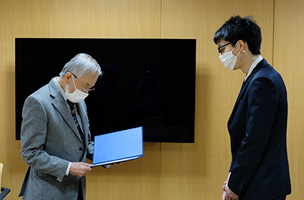
Specially Appointed Assistant Professor
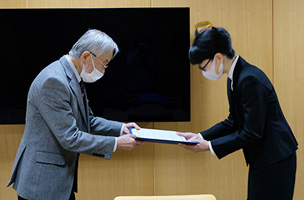
Specially Appointed Assistant Professor
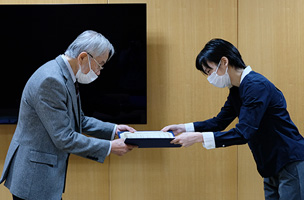
Post Doc.
2021-3-25
Comprehensive Academy Class of 2020 Special Event: Getting to Know Prof. Ohsumi
The Comprehensive Academy held a special lecture, “Getting to Know Prof. Ohsumi” on March 25, 2021, from 3:00 pm to 5:00 pm. The special event program provides young researchers with an opportunity to hear from a world-renowned scientist about his or her own life and research history, the scientist’s advice for young researchers, and other topics that are not usually available at a conventional talk session.
This time, we invited Professor Emeritus Yoshinori Ohsumi, who was awarded the Nobel Prize in Physiology or Medicine in 2016 and has been the headmaster of the Specialized Academy on Cell Science, to deliver the lecture. In this Special Lecture, we had 13 participants, 12 academy members of Class of 2020 as well as a members of Class of 2019 who missed the Dr. Ohsumi’s seminar last year. The participants were seated at sufficient intervals with masks on as the coronavirus infection was not under control yet. In his talk, Dr. Ohsumi provided an engaging outline of his career that included a wealth of valuable information for budding researchers. During the Q&A session after the talk, Dr. Ohsumi took time to answer all of the many and various questions from academy members one by one, with his advice leaving a lasting impression.
It was regretful that we were not able to hold a social gathering this time to avid COVID-19 infection. Dr. Ohsumi introduced his "messages to young people" at the very end of his talk. All of them are very profound and helpful to young researchers in various aspects of their lives.
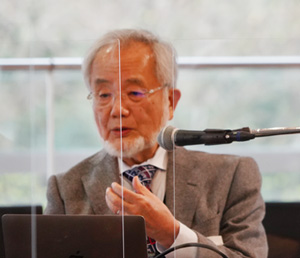
- 1. Think about the time period in which you are living in the long history of mankind.
- 2. Don't get caught up in authority or common sense, but value the questions that interest you.
- 3. Start from nature and phenomena, not from articles and floods of information.
- 4. Don't be afraid to be different and find your own way.
- 5. Don't follow trends. Competition is not the only driving force in science.
- 6. Watch with your own eyes, and cherish small discoveries.
- 7. Think about what "useful" means.
- 8. Return to the initial question repeatedly.
- 9. Think about what lies beyond the research at hand.
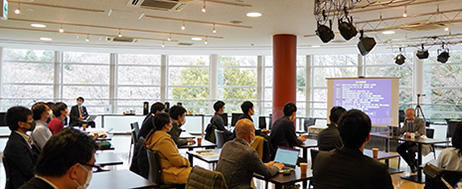
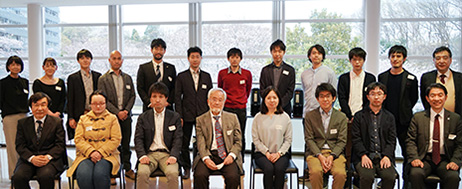
Hold your breath and take off your mask. Say cheese!
2021-3-5
The Comprehensive Academy Holds a Seminar for all the members of the Academies.
The Organization for Fundamental Research held a seminar for young researchers on Friday, March 5, 2021 from 1:00 pm to 2:30 pm with online conference system Zoom due to the severe influence of Covid-19. The seminar was originally planned as a part of the Comprehensive Academy program, which aims to train and nurture the next generation of researchers at this critical stage in their development as top-level international scholars. We however opened the meeting to not only the members of the Comprehensive Academy Class of 2020, but also to members of the Specialized Academies. This time, we invited an excellent speaker from outside the university to give important guidance to our young researchers as they prepare for a career in research. For this event, we decided to focus on the important area of tactics to gain research activities.
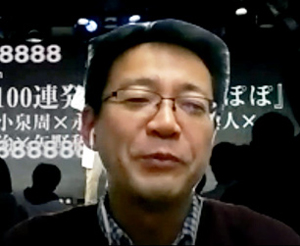
What is needed to improve research capabilities? - Reading from various indicators -
Dr. Amane Koizumi, Specially Appointed Prof., National Institute of Natural Sciences
After graduating from Keio University School of Medicine, Dr. Koizumi became an assistant professor in the Department of Physiology at Keio University School of Medicine, and then studied at Harvard Medical School before becoming an associate professor at the National Institute for Physiological Sciences (NINS). After serving as an academic researcher at the Ministry of Education, Culture, Sports, Science and Technology (MEXT) and a science communication fellow at Japan Science and Technology Agency (JST), he has been active in a number of government policy subcommittees as a specially appointed professor and University Research Administrator (URA) director at the National Institute of Natural Sciences (NINS), including the development of methods for analyzing the research capacity of universities and analysis of the social impact of research. In this lecture, he introduced how Japanese universities are viewed by the world through the indices of THE World University Rankings, and then explained what we could do to improve our university ranking as a paradoxical lesson. He also described the skill sets that researchers need to acquire and the importance of interdisciplinary research and international collaboration from a broad perspective based on his own experiences.
We conducted an anonymous survey after the seminar, and received responses from 27 out of 32 Academy members who attended the seminar. More than 85% of the participants responded that the lecture helped them to understand the content better. We will hold seminars not only on the same issues, but also on new themes next year.

2021-2-5
Annual Research Report Conference
The Organization for Fundamental Research (ORF) was established by the Tokyo Institute of Technology (Tokyo Tech) to nurture young researchers who will be responsible for the pioneering science and technologies of tomorrow. Dr. Toru Hisabori, Director of the ORF, presided over the annual research report conference on February 5, 2021 via online conference system Zoom, due to the serious conditions of the new coronavirus infection. The event was attended by more than 70 people. Including Dr. Kazuya Masu, President of Tokyo Tech, and other university officials. The CFR has enabled the formation of three Specialized Academies, one each in the cutting-edge fields of cell science led by Dr. Yoshinori Ohsumi, quantum computing led by Dr. Hidetoshi Nishimori and organic chemistry led by Dr. Keisuke Suzuki, as well as the Comprehensive Academy led by Dr. Naoto Ohtake, where new assistant professors from diverse backgrounds are able to study for three months.
Director Hisabori
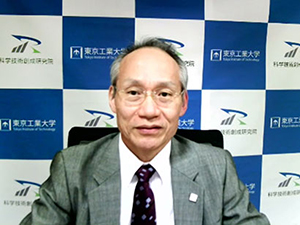 The debriefing session began with a greeting from Director Hisabori, followed by some words of encouragement from President Masu to the Academy members.
The debriefing session began with a greeting from Director Hisabori, followed by some words of encouragement from President Masu to the Academy members.
Dr. Kazuya Masu, President, Tokyo Tech
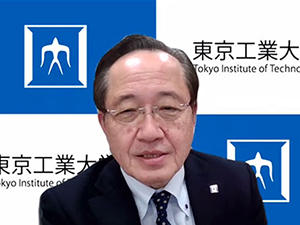 The spread of the new coronavirus infection across the world has seriously affected the activities of our university, and I know that all of you involved in the organization have made a great deal of efforts. The executive board of the university has been discussing the future plan of the organization on a regular basis, and I am considering incorporating the plan into the 4th Mid-term Plan of the National Universities starting in FY2022. I was very much looking forward to this meeting as an opportunity to hear directly from all of you about the results of your daily work, but it was unfortunate that the meeting had to be held online due to the declaration of an emergency. I do hope that we are able to discuss lots of issues in face-to-face next time.
The spread of the new coronavirus infection across the world has seriously affected the activities of our university, and I know that all of you involved in the organization have made a great deal of efforts. The executive board of the university has been discussing the future plan of the organization on a regular basis, and I am considering incorporating the plan into the 4th Mid-term Plan of the National Universities starting in FY2022. I was very much looking forward to this meeting as an opportunity to hear directly from all of you about the results of your daily work, but it was unfortunate that the meeting had to be held online due to the declaration of an emergency. I do hope that we are able to discuss lots of issues in face-to-face next time.
Next, the four headmasters, Dr. Ohsumi (Specialized Academy of Cell Science), Dr. Nishimori (Specialized Academy of Quantum Computing), Dr. Suzuki (Specialized Academy of Organic Chemistry) and Dr. Ohtake (Comprehensive Academy) gave an overview of the annual activities of each Academy.
Dr. Yoshinori Ohsumi, Headmaster, Specialized Academy of Cell Science.
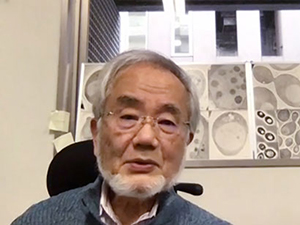 I would like to express my gratitude for the extremely smooth progress of the research activities of the Cell Biology Research Center thanks to this Academy. This year, two facilitators and an academy member obtained suitable permanent positions in Japan or abroad. The four activities of this Academy are as follows. In the next year, we would like to keep the same four activities as this year.
I would like to express my gratitude for the extremely smooth progress of the research activities of the Cell Biology Research Center thanks to this Academy. This year, two facilitators and an academy member obtained suitable permanent positions in Japan or abroad. The four activities of this Academy are as follows. In the next year, we would like to keep the same four activities as this year.
- 1. Discussions: Senior faculty members provide messages to young people. It was difficult to hold this meeting this year due to the effects of the Corona disaster, but one meeting was held online. We would like to actively hold online meetings in the future.
- 2. Colloquium: Invite lecturers domestically and internationally to introduce the latest research results. Not held this term. Although it may be difficult, we would like to invite lecturers in the future.
- 3. Research funds for members: Effective use of funds for research.。
- 4. Shared laboratories and equipment: Continue to increase shared equipment. Equipment sharing is also underway from each laboratory.
Dr. Hidetoshi Nishimori, Headmaster, Specialized Academy of Quantum Computing.
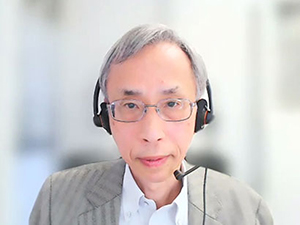 I have run the Academy with a few members including a facilitator, although we have many members from inside and outside of the university in my research unit. The following two activities are being carried out by our Academy. In addition we are also considering holding and participating in online international conferences in the next year.
I have run the Academy with a few members including a facilitator, although we have many members from inside and outside of the university in my research unit. The following two activities are being carried out by our Academy. In addition we are also considering holding and participating in online international conferences in the next year.
- 1. Seminars: A wide range of researchers from Japan and abroad are invited to give presentations. We held online seminars this term.
- 2. Research expenses for members: We used the funds to improve the remote work environment this term due to the difficulty of traveling,
Dr. Keisuke Suzuki, Headmaster, Specialized Academy of Organic Chemistry.
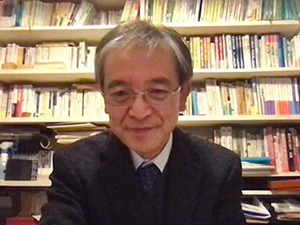 I think of synthetic organic chemistry as "micro-architecture based on carbon atoms. We would like to use our Academy as a salon. The following two activities have been carried out in our Academy this year.
I think of synthetic organic chemistry as "micro-architecture based on carbon atoms. We would like to use our Academy as a salon. The following two activities have been carried out in our Academy this year.
- 1. Interactive seminar: Introduction of research by speakers from Japan and abroad. This term, two lecturers from Japan and one from overseas gave online seminars.
- 2. Research expenses for Academy members: purchase of consumables and participation in conferences. As it was difficult to attend conferences this term, we purchased consumables for experiments.
Dr. Naoto Ohtake, Headmaster, Comprehensive Academy
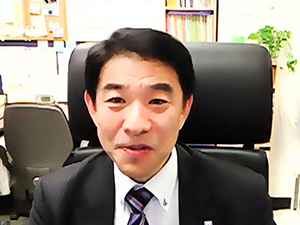 The purpose of the Comprehensive Academy is to make young assistant professors raise their research effort and think deeply about their own themes within a limited period, i.e., three months, of their stay in the Academy. This year, the program was held just once in the third quarter with 15 Academy members due to the corona virus disaster. I would like to express my sincere gratitude to the directors and the administrative staffs of schools for their help in nominating the Academy members. The program for this year is 1. Orientation, 2. Individual interview, 3. Introductory presentation of research field, 4. Workshop "Thinking about the connection between the future society and your own research," 5. Meeting with Dr. Nishimori, 6. Presentation of future research theme, and 7. Meeting with Dr. Ohsumi. We have already conducted 1 to 6, and 7 is scheduled for next month. Although each member vigorously presented a new research proposal developed through the activities of the program, it would be less meaningful if it remained just a proposal. The university kindly provided us with the "New Research Challenge Incentive Fund" this year as well as last year. Eleven individual research projects and four joint research projects were proposed to the research fund by the members. All of the proposals have been successfully accepted by the organization and are now being implemented. Most of the opinions were positive in the anonymous questionnaire for the members. The rate of positive comments was surprisingly higher in this year than that in the previous year although we had difficulties in interaction opportunities due to the online events. In the Comprehensive Academy, we do realize that young researchers are growing up through interaction and awareness with researchers of different fields of the same generation, and the Academy is surely functioning as a foothold for future collaboration. The Organization for Fundamental Research is currently located in the Institute of Innovative Research, I believe however that strong collaboration with other Schools in Tokyo Tech will be critical in the near future.
The purpose of the Comprehensive Academy is to make young assistant professors raise their research effort and think deeply about their own themes within a limited period, i.e., three months, of their stay in the Academy. This year, the program was held just once in the third quarter with 15 Academy members due to the corona virus disaster. I would like to express my sincere gratitude to the directors and the administrative staffs of schools for their help in nominating the Academy members. The program for this year is 1. Orientation, 2. Individual interview, 3. Introductory presentation of research field, 4. Workshop "Thinking about the connection between the future society and your own research," 5. Meeting with Dr. Nishimori, 6. Presentation of future research theme, and 7. Meeting with Dr. Ohsumi. We have already conducted 1 to 6, and 7 is scheduled for next month. Although each member vigorously presented a new research proposal developed through the activities of the program, it would be less meaningful if it remained just a proposal. The university kindly provided us with the "New Research Challenge Incentive Fund" this year as well as last year. Eleven individual research projects and four joint research projects were proposed to the research fund by the members. All of the proposals have been successfully accepted by the organization and are now being implemented. Most of the opinions were positive in the anonymous questionnaire for the members. The rate of positive comments was surprisingly higher in this year than that in the previous year although we had difficulties in interaction opportunities due to the online events. In the Comprehensive Academy, we do realize that young researchers are growing up through interaction and awareness with researchers of different fields of the same generation, and the Academy is surely functioning as a foothold for future collaboration. The Organization for Fundamental Research is currently located in the Institute of Innovative Research, I believe however that strong collaboration with other Schools in Tokyo Tech will be critical in the near future.
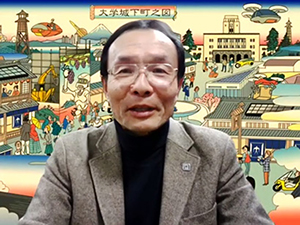 The conference ended with a speech by Executive Director Dr. Osamu Watanabe.
The conference ended with a speech by Executive Director Dr. Osamu Watanabe.
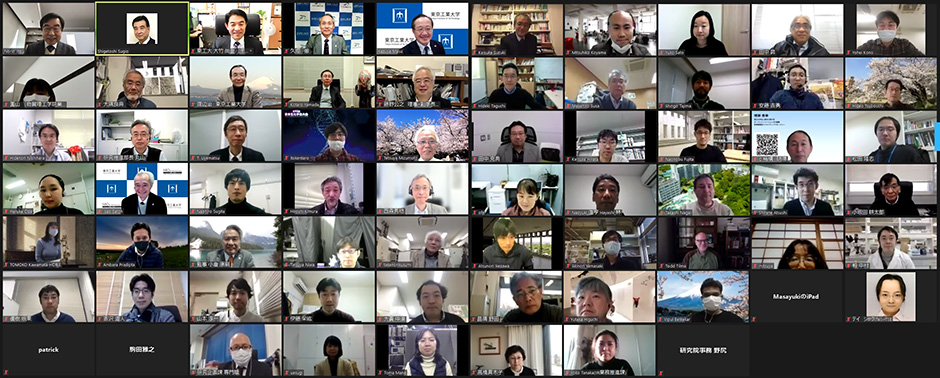
2021-2-5
The Comprehensive Academy Holds a Seminar for all the members of the Academies.
The Organization for Fundamental Research held a seminar for young researchers on Friday, February 5, 2021 from 1:00 pm to 4:00 pm with online conference system Zoom due to the severe influence of Covid-19. The seminar was originally planned as a part of the Comprehensive Academy program, which aims to train and nurture the next generation of researchers at this critical stage in their development as top-level international scholars. We however opened the meeting to not only the members of the Comprehensive Academy Class of 2020, but also to members of the Specialized Academies. This time, we invited two excellent speakers to give important guidance to our young researchers as they prepare for a career in research. For this event, we decided to focus on the important area of intellectual property in academia and strategies of research management in Tokyo Tech.
Fundamentals of Intellectual Property Rights: the Role of Patents and Copyright in Research.
Dr. Yuko Hayashi, Specially Appointed Prof., Tokyo Institute of Technology
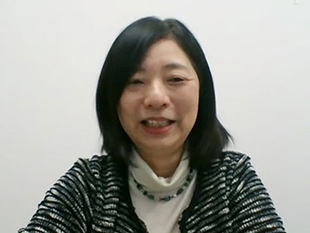 After graduating from the Department of Chemistry in the Faculty of Science and the Graduate School of Science and Engineering of Tokyo Tech, Dr. Hayashi worked as a corporate researcher and a faculty member of Tokyo Tech. After moving to the Industry Liaison Office of Tokyo Tech as a coordinator, she has made great achievements over the years facilitating the acquisition of intellectual property rights and in the transfer of technologies to industry. She is currently working as a specially appointed professor in the Office of Research and Innovation at our university. In this talk, Dr. Hayashi gave an excellent and accessible overview of intellectual property rights, defining relevant terms and highlighting important points to help researchers understand this complex field. Dr. Hayashi provided interesting examples of the relevance of patent rights and copyright that provided a solid foundation for early career researchers.
After graduating from the Department of Chemistry in the Faculty of Science and the Graduate School of Science and Engineering of Tokyo Tech, Dr. Hayashi worked as a corporate researcher and a faculty member of Tokyo Tech. After moving to the Industry Liaison Office of Tokyo Tech as a coordinator, she has made great achievements over the years facilitating the acquisition of intellectual property rights and in the transfer of technologies to industry. She is currently working as a specially appointed professor in the Office of Research and Innovation at our university. In this talk, Dr. Hayashi gave an excellent and accessible overview of intellectual property rights, defining relevant terms and highlighting important points to help researchers understand this complex field. Dr. Hayashi provided interesting examples of the relevance of patent rights and copyright that provided a solid foundation for early career researchers.
Tokyo Tech Research Initiatives
Dr. Osamu Watanabe, Executive Director, Tokyo Institute of Technology
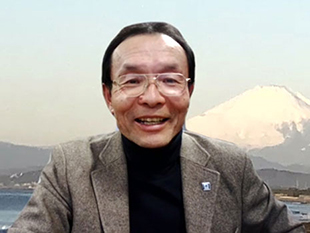 Dr. Watanabe graduated from the Department of Information Science in the Faculty of Science at Tokyo Tech. Before finishing his course works at the Graduate School of Science and Engineering, he was appointed as an assistant professor at Tokyo Tech. He was later promoted to associate professor and then professor at Tokyo Tech, where he has made tremendous contributions to research and education in the field of information science. He became the Dean of the School of Information Science and Technology in 2016, and the Executive Director of Tokyo Tech in 2018, where he has been working hard to promote research and industry-university collaboration. In this presentation, he introduced the three action plans of Tokyo Tech's research strategies and their specific initiatives, as well as support organizations and activities for research, industry-academia collaboration, and venture startups followed by a 30-minute question-and-answer session with the floor, which led to an enthusiastic discussion on a variety of topics.
Dr. Watanabe graduated from the Department of Information Science in the Faculty of Science at Tokyo Tech. Before finishing his course works at the Graduate School of Science and Engineering, he was appointed as an assistant professor at Tokyo Tech. He was later promoted to associate professor and then professor at Tokyo Tech, where he has made tremendous contributions to research and education in the field of information science. He became the Dean of the School of Information Science and Technology in 2016, and the Executive Director of Tokyo Tech in 2018, where he has been working hard to promote research and industry-university collaboration. In this presentation, he introduced the three action plans of Tokyo Tech's research strategies and their specific initiatives, as well as support organizations and activities for research, industry-academia collaboration, and venture startups followed by a 30-minute question-and-answer session with the floor, which led to an enthusiastic discussion on a variety of topics.

We conducted an anonymous survey after the seminar, and received responses from 23 out of 28 Academy members who attended the seminar. More than 95% of the participants responded that the both lectures helped them to understand the content better and that they would recommend the lectures to other young researchers. We will hold seminars not only on the same issues, but also on new themes next year.
2021-1-31
The 2nd Interactive Seminar of specialized academy of organic chemistry (Suzuki Juku)
Specialized Academy of Organic Chemistry (Suzuki-juku) is trying to nurture young researchers in an international atmosphere.Recently, four people have joined as international advisors, Prof. Jeffrey Bode [Swiss Federal Institute of Technology (ETH)], Prof. Lukas Hintermann (Technical Univ. Münich), Emeritus Prof. Biing-Jiun Uang (NTHU, Taiwan) and Prof. Markus Tius (Univ. Hawaii).
On January 23, the 2nd Interactive Seminar was held online, starting with a presentation by Dr. Bode that was followed by active discussion among the participants. Dr. Bode is now renowned as a prominent scientist in the field of chemistry–biology interface. It was about 20 years ago that he and Dr. Hintermann, another participant, shared the same postdoctoral time in Suzuki Lab. at O-okayama campus.
Dr. Bode began his talk with a photo of the crowd at Shinagawa Railway Station, which was liken to a living cell stuffed with all different sorts of organic entities. He mentioned that if a pistol is fired in such a crowd, it's easy to recognize who the victim was, but the sniper may escape by getting into the crowd. Like a "Zen Riddle", this was a chemical biology question to seek for the means of identifying the specific single molecule in a living cell. He urged us to imagine a molecule, which, by the aid of external stimuli, such as light, generates two reactive species of different lifetimes, one is highly reactive, short-lived (bullet) and the other is less reactive, longer-lived (gun smoke).
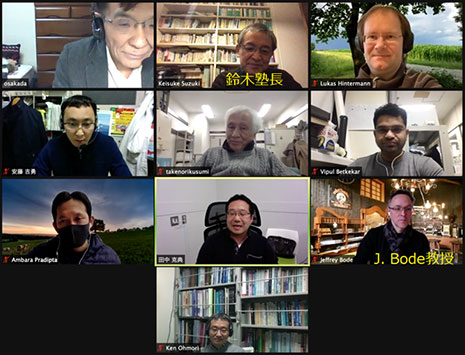 This idea differs from textbook chemistry, in that splitting of an organic molecule would usually generate two species of similar reactivities. Through long discussions, many ideas were proposed, but no wonder definite conclusion was not reached. Importantly, however, the participants were guided to think about unfamiliar issues. This experience shared here would be an intriguing hint to our future activities.
This idea differs from textbook chemistry, in that splitting of an organic molecule would usually generate two species of similar reactivities. Through long discussions, many ideas were proposed, but no wonder definite conclusion was not reached. Importantly, however, the participants were guided to think about unfamiliar issues. This experience shared here would be an intriguing hint to our future activities.
Finally, a common occurrence of international gatherings is added here: a planned participant from Hawaii, Dr. Tius, failed to join, due to a misunderstanding on a 19-hour time difference, but across the International Date Line. We are hoping to welcome him next time.
2020-12-9
Tokyo Tech News: Amino Acid Recycling in Cells: Autophagy Helps Cells Adapt to Changing Conditions
Scientists at Tokyo Institute of Technology (Tokyo Tech), Japan, have shown for the first time how specific metabolites produced by autophagy are utilized by a cell. They discovered that in budding yeast adapting to respiratory growth, autophagy—an intracellular recycling system—recycles the amino acid serine to trigger growth through mitochondrial one-carbon metabolism. This study shows how the recycling function of autophagy is crucial for adaptation to fluctuating environmental conditions.
Tokyo Tech News>>
2020-12-1
Interactive seminar of specialized academy of organic chemistry (Suzuki Juku)
The specialized academy of organic chemistry (Chairman Keisuke Suzuki, Professor Emeritus) aims at nurturing young active scientists related to the broadest sense of organic chemistry. Particular focus is laid on harmonizing synthesis and analysis.
On December 1st, 2020, an online seminar was presented by Dr. Takenori Kusumi, a specially appointed professor of Tokyo Tech. His research focused on the marine natural products chemistry, centering attention to the isolation and structure elucidation. It is now more than a decade after his retirement from the Tsukuba and Tokushima Universities, and he has continuously served for guiding younger researchers as a specially appointed professor at Tokyo Tech.
His lecture title on this seminar was "Determination of Absolute Stereochemistry by Modified Mosher's Method".
Starting from his research history, he showed memorable photos of his former colleagues, including Professor Koji Nakanishi, Columbia University, USA. Also he showed marvelous pictures of various marine creatures, such as shellfish, corals, and sponges.
His main topic was the structure determination of marine natural products, which is quite challenging, because often extremely minute, milligrams or even microgram amounts of the compounds could be purified and isolated. As such, the assignment of the absolute configuration is particularly difficult.
Dr. Kusumi succeeded in developing a useful method of determining the absolute configuration of natural products by NMR spectroscopy. In 1973, H. S. Mosher reported a useful chiral derivatizing agent, MTPA, as a potential method of estimating the enantiomeric excess of chiral secondary alcohols. A model was proposed to predict the absolute stereochemistry by 19F NMR, which, however, had a problem of poor reliability by the absence of theoretical basis and few applied examples. Prof. Kusumi devised an ingenious way to settle the issues by derivatizing the sample alcohol with both enantiomers of MTPA, and established an empirical rule to elucidate the absolute stereochemistry of the original alcohol. Through a systematic investigation on the NMR spectra of the diastereomeric MTPA esters prepared from many samples of chiral secondary alcohols, he discovered a clear correlation of the diastereomeric NMR signals and the absolute configuration. This method provided a simple, highly reliable, and highly evaluated method for determining the three-dimensional structure of a trace of natural products. The original paper of this study has been cited more than 2800 times, which is rare in research papers of organic chemistry.
Furthermore, he extended the idea to other classes of compounds, amines and sulfoxides. Thus, he established general methods for otherwise difficult structure determination of organic molecule.
His lecture presented a beautiful example of an orchestration of "synthesis" (converting a sample in question into a specific derivative), providing samples that are amenable to "analysis" by the high-field NMR spectroscopy by the Kusumi rule.
The participants of the seminar, including young faculty members, and advisory faculty members, made various questions and comments on the lecture topics, such as further scope of this method to other classes of compounds, the influence of the solvent used for the measurement, etc. Dr. Kusumi mentioned the efficacy of the combination of the NMR data with circular dichroism (CD) and X-ray crystal structure analysis in his recent study. Important roles of calculations on the conformations are also discussed. An advisory faculty suggested the emergence of supercomputer would enable structural calculation that is far more precise than the conventional methods, and commented that reexamination of theoretical chemistry and experimental results can be successful in the near future.
This event was a good opportunity for the young members of Suzuki Juku to relive the excellent research in organic chemistry and think about the process. In addition, we found that the online meeting in English worked well, and that both communication and discussion were fruitful. In the future, we will proceed with activities in this way.




2020-12-01
Presentation of certificates of appointment
Dr.Ambara Rachmat PRADIPTA was inducted as an academy scholar into the Specialized Academy for Organic Chemistry of the Organization for Fundamental Research on the 1st of December. Dr. Ambara received his certification of induction from Academy Head Keisuke Suzuki.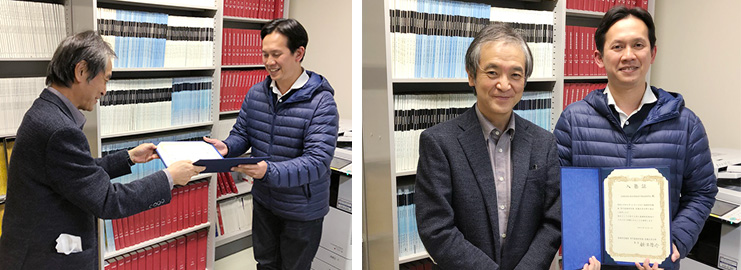
Hold your breath and take off your mask. Say cheese!
2020-11-18,19,24
Final Presentation of 2020 Third-Term Comprehensive Academy Member Research Projects.
Fifteen academy members participating in the third-term comprehensive academy program delivered reflective talks on the impact of the academy on their research on November 18, 2020, from 10:00 a.m. to 12:00 p.m. in the Collaboration Room, Building W9 at Ookayama Campus, on November 19, 2020, from 10:00 a.m. to 12:00 p.m. in the Conference Room No. 1, Building S2 at Suzukakedai Campus and on November 24, 2020, from 1:30 p.m. to 4:00 p.m. in the Conference Room No. 1, Building S2 at Suzukakedai Campus. Each academy member gave a 10-minute presentation on the research concepts developed during the academy program, and a 10-minute Q&A session followed each presentation. Members were instructed to make their talks as easy to understand for those who were not familiar with their particular specialty. Most presenters described how they had developed on ideas that they formulated during Academy activities, such as those inspired by other members’ research outlined at the "Research Project Introduction" session, those taking on a future-oriented perspective drawing on discussions at the "Connecting Your Research with Tomorrow’s Society" session, and those stimulated by Dr. Nishimori's advice at the Special Lecture session. The 70 questions posed during the Q&A session largely reflected the mutual interests developed during the program, and the presenters’ responses showed additional depth and clarity following the three months of reflection and idea exchange. Despite a lot of time ripped into lectures this quarter due to COVID-19, it was clear from the engagement of participants that a strong enthusiasm for integrating different disciplines and proactively adopting new ideas was a key outcome of the comprehensive academy. We hope that the research plans of each academy member will be further refined through discussions with colleagues in their respective fields of expertise, and will come to fruition through collaboration with scientists from diverse backgrounds. After the presentation, a certificate awarding ceremony was held to mark the completion of the formal element of the third-term program.
The Comprehensive Academy has started accepting applications for the "New Research Challenge Incentive Grant" to support the challenge of new research themes set by the academy members. This grant has been established since last year by the worm support of the executive office of the university with the financial resources of the National University Reform initiative and Strengthening Grant. We hope that all of the academy members will submit proposals for challenging research themes that they have developed from the activities of the Comprehensive Academy. The grant will be awarded from the coming December after a review by the faculty members of the Academy.
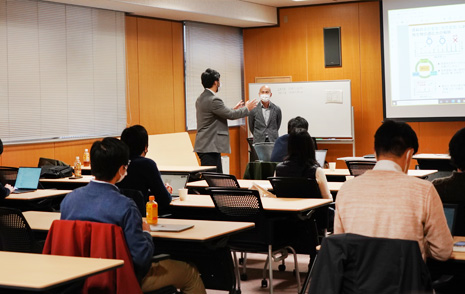
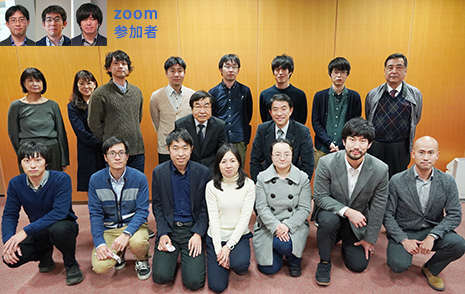
Hold your breath and take off your mask. Say cheese!
2020-11-10
Tokyo Tech News: The Neurobiology of Thirst: The Neural Mechanisms that Control Hydration
Scientists at the Tokyo Institute of Technology (Tokyo Tech) provide deeper insights into neural thirst control. Their study published recently in Nature Communications indicates that cholecystokinin-mediated water-intake suppression is controlled by two neuronal ‘thirst-suppressing’ sub-populations in the subfornical organ in the brain; one population is persistently activated by excessive water levels, and the other, transiently after drinking water.
Tokyo Tech News >>
2020-11-9
Comprehensive Academy Class of 2020 Special Event: Getting to Know Prof. Nishimori.
The Comprehensive Academy held a special lecture, “Getting to Know Prof. Nishimori” on November 9, 2020, from 3:00 pm to 5:00 pm. The special event program provides young researchers with an opportunity to hear from a world-renowned scientist about his or her own life and research history, the scientist’s advice for young researchers, and other topics that are not usually available at a conventional talk session.
This time, we invited Professor Emeritus Hidetoshi Nishimori, who has been the headmaster of the Specialized Academy on Quantum Computing, to deliver the lecture. Eight out of 15 academy members of Class of 2020 participated in this Special Lecture, except for seven who were unable to attend due to unavoidable reasons. In his talk, Dr. Nishimori provided an engaging outline of his career that included a wealth of valuable information for budding researchers. During the Q&A session after the talk, Dr. Nishimori took time to answer all of the many and various questions from academy members one by one, with his advice leaving a lasting impression.

It was very regretful that we were not able to hold a social gathering this time to avid COVID-19 infection. Here are just several comments out of the many messages provided by Dr. Nishimori:
- 1. When I was young, I liked to learn and think alone, not in groups.
- 2. There were no right answers for my first research theme which I tackled in my undergraduate lab. Now I believe that research is to think about how to deal with questions that may or may not have answers. I feel it was a good experience to deal with such a subject at the beginning of my research career.
- 3. I went to Carnegie Mellon University as a post-doctoral fellow with one-year appointment. I was not familiar with the post-doc system in the U.S. before I went there. However, I realized I had to look for my next position right after I arrived there. I would never try it again because now I know it would be tough to face such situation for a young scientist who had already married, I took me a half year to find another two-year appointment at Rutgers University. I spent a year and half in New Jersey until I joined Tokyo Tech.
- 4. Words are important. The terminology "quantum annealing" was initially called "quantum adiabatic computing", which was hard for U.S. researchers to speak distinctly in English. When I happened to call it "quantum annealing" in reference to the terminology "simulated annealing" used in statistical mechanics at the time, U.S. researchers found it much easier to say, and the terminology "quantum annealing" has finally taken root.
- 5. The culture is different. United States and China now invest billions of U.S. dollars a year in quantum computing research. Such a big investment is possible because the researchers focus both on civilian and military targets, which is quite different from the situation in Japan. In terms of human resource development, many graduate students in quantum computing in the U.S. study quantum mechanics as a minor subject, while few students in Japan do so. We won't be able to come close to solving our problems unless we flexibly absorb knowledge from interdisciplinary fields.
- 6. If you want to do what you love to do, it is important to be prepared to at least put into words the things you need to do to make it happen. If you don't focus on what you like, you won't get anywhere. It is also hard to deal with just what you like if you just put it all together. In addition, you should learn how to come to terms with it.
- 7. In computer science, no matter how far ahead of time, you need to explain that your research will be useful to the public. A quantum computer is useless unless it brings some benefit, so we need to show that it is useful for computing such a task.
- 8. At the end of the lecture, I would like to introduce the following from MIT Technology Review.
- Interviewer:
Could you give a message to young people who are interested in ”the Innovators Under 35 Japan”? - Dr. Nishimori:
I guess you should not worry about what an elderly person like me says. Just do as you please. - Interviewer:
What a logical contradiction that is (Laughs) ! - Dr. Nishimori:
Yes, that's right. But I just want you to be concerned about "don't worry about it".
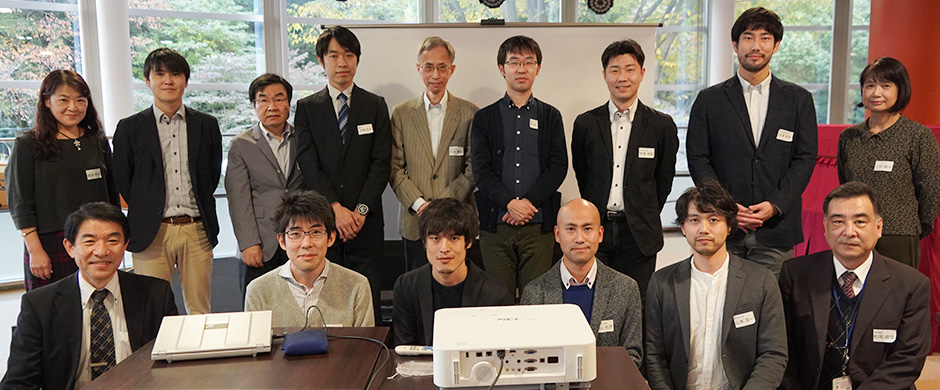
Group photo. Hold your breath and take off your mask. Say cheese!
2020-10-29
"Connecting Your Research with Tomorrow's Society" workshop held for the Third-term 2020 Comprehensive Academy Members.
The "Connecting Your Research with Tomorrow's Society" workshop was held on Thursday, October 29, 2020, from 2:00 p.m. to 5:15 p.m., in collaboration with the Laboratory for Design of Social Innovation in Global Networks (D-Lab) and the Organization for Fundamental Research. This time, we employed an online conference system Zoom and a virtual sticky note system MIRO to avoid coronavirus infection. This workshop aims to provide third-term academy members with an opportunity to step back and conduct a broad overview of their research project, thereby encouraging a new awareness of the connection between their own research and the future needs of society. Academy members discussed the impact that research will be able to overcome COVID-19 and realize a beautiful society in the future by considering a series of future scenarios. The session enhanced the ability of participants to incorporate a macroscopic perspective when thinking about research while also enhancing collaboration and communication skills.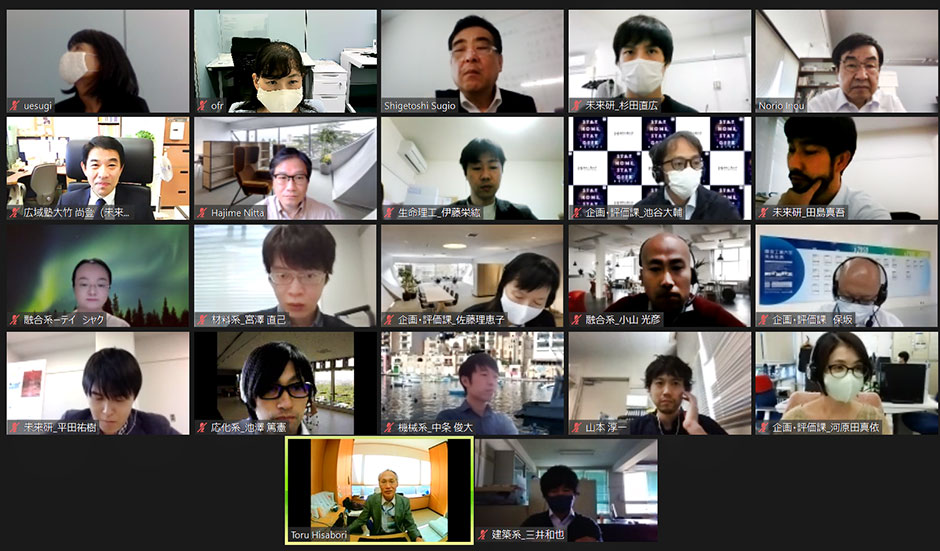
The workshop commenced with opening remarks delivered by Dr. Hisabori, Director of the Organization for Fundamental Research. Prof. Ohtake, Headmaster of the Comprehensive Academy, then explained the significance and broad objectives of the workshop, and Dr. Hajime Nitta of D-Lab gave a detailed introduction to the workshop program. The 11 participating academy members were divided into three groups, and each participant gave one-minute self- introduction before starting their group works. In the first phase of the group work, each participant proposed up to five "current issues" to be solved in the corona disaster, shared the ideas and classified the issues to focus on one as a group with KJ method. A representative from each group presented the group's issue and shared it with everyone through the following question and answer session. In the second phase of the group work, each group discussed the issue combined with one of the five future scenarios that had been given in advance by D-Lab to create a "new solution" as a product or service in the future. The focus here was on open-ended discussion with no cost or time limits. As a final part of the group work, each group broke down the new solutions into various "scientific and technological features" and examined how a research subject of the individual member could contribute to solving the problems of each feature. They also discussed the relationship between these features, the timeline, and the development of the social environment necessary for their realization. At the end of the session, representatives of each group presented details of their new solutions and engaged in a question and answer session and an exchange of ideas. Each participant filled out a questionnaire on this workshop a week later.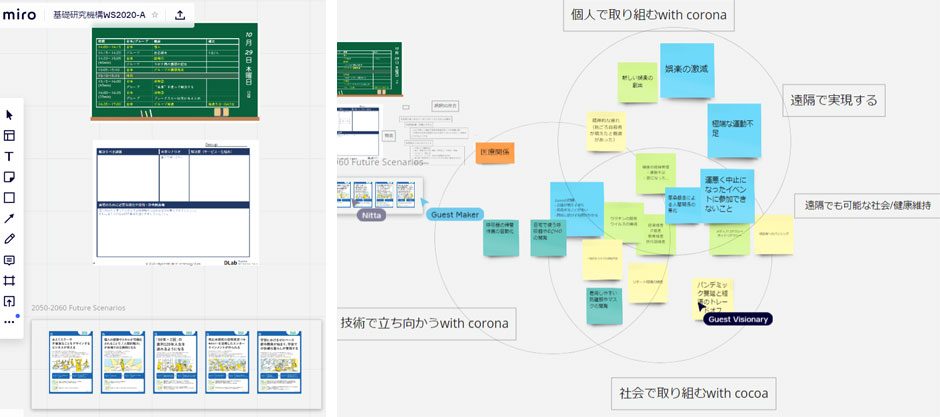
The members were not been informed of the workshop content until the day, and some were initially challenged by the structure of the session. However, as the discussion begun and interesting ideas were exchanged, the tone of the session became remarkably positive. During the final presentation session, the Q&A session was lively and participants engaged in a robust exchange of ideas, as we have come to expect of academy members. It was a regret for the organizers that a social event followed by the workshop could not be held due to the corona environment, and we do hope it would be arranged some day in the near future.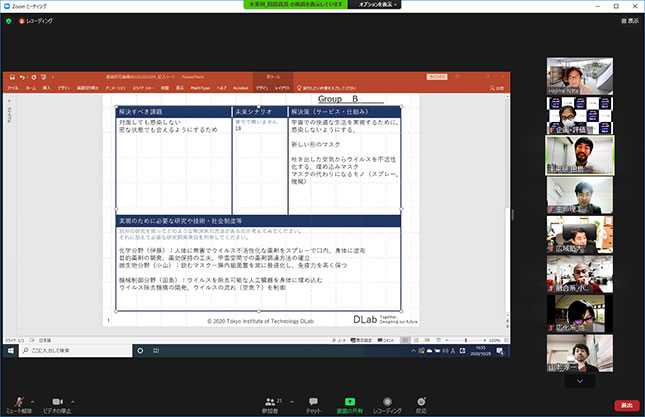
2020-10-28
Researcher Presentations for the Third-term Comprehensive Academy Class of 2020.
On October 23, 2020, from 9:30 am to 4:00 pm, 15 academy members in the third-term class of 2020 were invited to give presentations on their research fields via an on-line conference system. In this session, each academy member gave a 7-minute presentation about their past research to the interdisciplinary membership of the academy, followed by a 12-minute question-and-answer session, to deepen communication and learn about each other's research. Interdisciplinary communication is difficult for speakers as it can be challenging to introduce research interests and opinions to a non-specialist audience. The audience, too, must engage with and understand the speaker's thoughts and specialist knowledge before they are able to voice an opinion about the work. Thanks to the careful preparation of speakers and engagement of all members as an audience, a total of 85 questions and answers were actively debated even in COVID-19 circumstances, and members were able to share their valuable experiences, often from a unique and valuable perspective, with each other.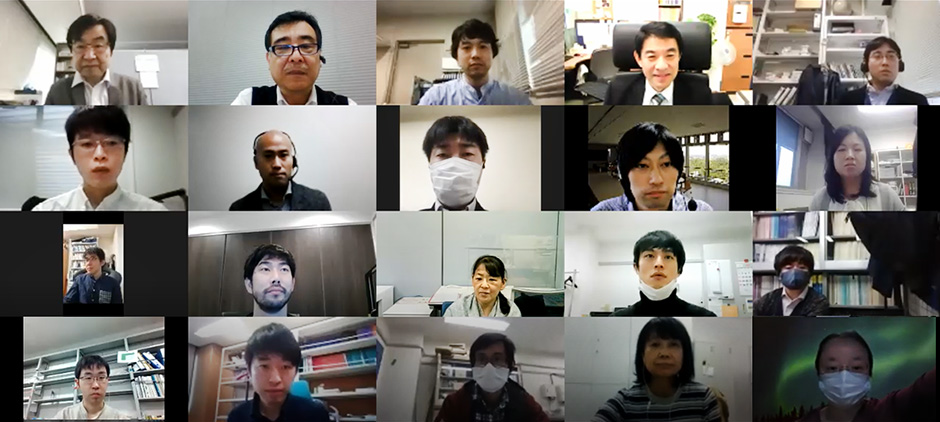
2020-10-26
Organic Chemistry Headmaster, Prof. Emeritus Keisuke Suzuki Receives Fujihara Award
Tokyo Tech News (Japanese)>>
2020-10-13
Tokyo Tech News: Asst. Prof. Hidenori Nishihara receive "Young Scientist Initiative Award, SESJ"
Asst. Prof. Hidenori Nishihara receive "Young Scientist Initiative Award, SESJ" from Society of Evolutionary Studies, Japan.
For further details, see the article in Tokyo Tech News.
2020-10-12
Orientation for the Comprehensive Academy′s Third-term Class of 2020.
Orientation sessions for third-term academy members of the class of 2020 were held on September 30, 2020 at the Collaboration Room, W9 Building, Ookayama Campus, and on the following day at the Conference Room No.1, S2 Building, Suzukakedai Campus. Of the 15 academy members, six attended the Ookayama session and nine the Suzukakedai session. In addition to receiving their induction certificates, the orientation program included the following activities:


- An explanation of the agenda by Associate Director Inou
- An outline of the purpose and activities of the Comprehensive Academy by Headmaster Ohtake
- Self-introductions by the staff of the academy
- A self-introduction session for all academy members
- The presentation of admission certificates by Headmaster Ohtake
- Signing of a pledge
- A talk about effective presentation methods by Associate Director Inou
- An introduction to academy events held outside the training period
- A Q & A session
Headmaster Ohtake delivered a talk that described the background to the Comprehensive Academy:
I would like to explain why Tokyo Tech has established the Comprehensive Academy and why you have been chosen to participate in this program. Tokyo Tech has been selected as a designated national university corporation in reflection of its core role in education and research, as well as its large contribution to society. Our goals for research are to strengthen governance, introduce research funds from outside the university, and ultimately to return funding to basic research. We have also identified three priority areas and three strategic areas that we aim to enhance as Tokyo Tech's key strengths, and further we have established the Laboratory for Design of Social Innovation in Global Networks to facilitate the integration of scientific and technological advances into society. As an element of these broader movements, the Organization for Fundamental Research (CFR) was formed to foster early-career scientists who will be active at the forefront of the global research. In addition, it must be important for academic researchers to take immediate action to respond to enormous social impacts of the COVID-19 that has been sweeping across the world since this spring. We launched the “Research Project for Overcoming Coronavirus Disasters” last June in the Institute of Innovative Research and are inviting faculty members of other schools of Tokyo Tech to participate in this project.
A survey by the Ministry of Education, Culture, Sports, Science and Technology (MEXT) in 2014 reported that assistant professors in Japan are only able to devote 60% of their time to research activities. In order to increase this number to 90%, the Specialized Academies are investing in people, funding, and facilities so that members can immerse themselves in basic research. The Comprehensive Academy is a short-term, three-month program that we also hope provides an opportunity for you to devote 90% of you time to seriously consider your future research directions. For this reason, we have decided to keep the activities of the Comprehensive Academy to a minimum and give you space for intellectual creativity. We strongly encourage you to participate in activities of the Academy, which have been designed to facilitate reflection on research questions.
I would like to mention two most important activities during your time at the Academy. First, you must spend a lot of time thinking about your own research theme for the next 10 years and give a presentation about your theme at the research theme setting presentation. Secondly, it is also important to build a human network for future research. Members of the first and second terms have been continuing to hold exchange meetings after they complete the program of the Academy, and some of them have started joint research projects that combine different fields of study, taking advantage of each other's strengths to obtain competitive funding. From the point of view of fostering young researchers, we will include the number of papers published and other data in the ongoing survey. We believe, however, it is further important for young researchers to tackle challenging research subjects and to take on the challenge of different fields.
I and all the staff will support you over the coming three months of this enjoyable program so that you can think about your future research themes. Please take pride in being a member of the Comprehensive Academy and work hard to improve your skills.
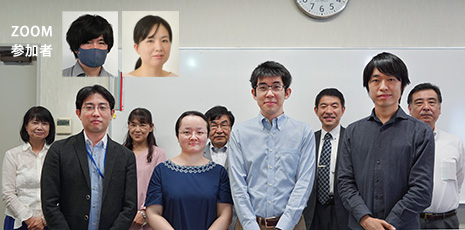
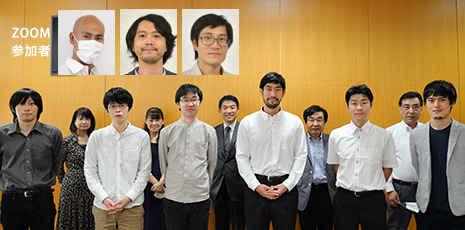
Hold your breath and take off your mask. Say cheese!
2020-9-10
Tokyo Tech News: Evidence of Power: Phasing Quantum Annealers into Experiments from Nonequilibrium Physics
Dr. Yuki Bando and his colleagues in Quantum Computing Unit at the Institute of Innovative Research recently published their research results on quantum simulation by quantum annealers.
They use commercially available quantum annealers, a type of quantum computer, to experimentally probe the validity of an important mechanism from nonequilibrium physics in open quantum systems. The results not only shed light into the extent of applicability of this mechanism and an extension of it, but also showcase how quantum annealers can serve as effective platforms for quantum simulations.
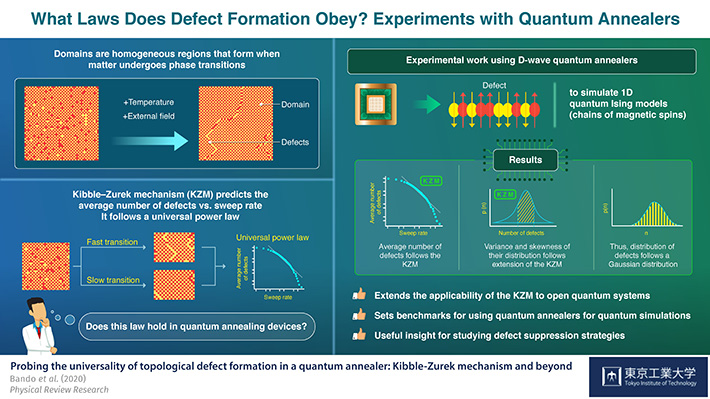
Tokyo Tech News >>
2020-7-17
Presentation of certificates of appointment
A ceremony was held on July 17, 2020 for the presentation of certificates of appointment for two new Academy Scholars of the Academy for Organic Chemistry.
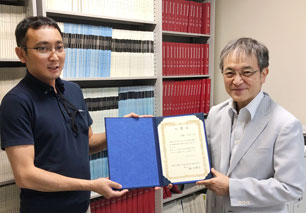
Dr. Yoshio Ando
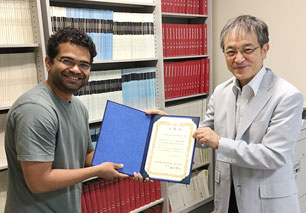
Dr. Betkekar Vipul Vithal
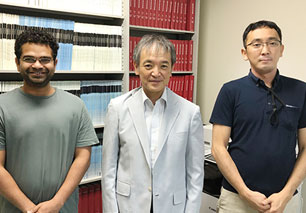
Hold your breath and take off your mask. Say cheese!
2020-7-6
Tokyo Tech News:
Specially Appointed Assistant Prof. Tetsuya Handa and his colleagues in the Cell Biology Center at the Institute of Innovative Research recently published their research about the molecular process of homologous recombination.
The results of this study were published in Nature Communications on June 11.
Tokyo Tech News (Japanese)>>
2020-6-24
Tokyo Tech News: Elucidating the mechanisms that activate homologous recombination
Assistant Professor Hideo Tsubouchi and his colleagues in the Cell Biology Center at the Institute of Innovative Research recently published their research about how homologous recombination is activated.
Dmc1 is the central protein that drives homologous recombination in sex cells. However, it has been known for some time that two different auxiliary factors, Swi5-Sfr1 and Hop2-Mnd1, are essential for the function of Dmc1 in living cells. How these factors differentially stimulate Dmc1 was not known. To address this question, Assistant Prof. Tsubouchi and his colleagues sought to reconstitute the homologous recombination process involving Dmc1, Swi5-Sfr1 and Hop2-Mnd1 in a test tube. They expressed these proteins in E. coli and purified them, then by combining the proteins with purified DNA substrates, they were able to study measure the activity of Dmc1 in vitro. Their results revealed that both Swi5-Sfr1 and Hop2-Mnd1 could activate Dmc1 individually, but the activation by Swi5-Sfr1 could easily be blocked by changing the structure of one DNA substrate. Importantly, Hop2-Mnd1 was oblivious to this change and could still stimulate Dmc1. Moreover, when the two auxiliary factors were combined, there was synergistic activation of Dmc1, indicating that the Swi5-Sfr1 and Hop2-Mnd1 function in a complementary, stepwise manner.
Homologous recombination is an important biological mechanism that has been observed in virtually all organisms, from bacteria to humans. This research provides novel insights into how homologous recombination is regulated during meiosis, the specialized cell division that gives rise to gametes in sexually reproducing organisms such as humans.
The results of this study were published on May 15 2020 in the journal PNAS (Proceedings of the National Academy of Sciences of the United States of America).
Tokyo Tech News>>
2020-5-27
2019 Comprehensive Academy "New Research Challenge Incentive Grant"
16 first-term and 13 second-term academy scholars participated in the 2019 Comprehensive Academy. During the three months of the program, participants expanded their research horizons beyond their own expertise by collaborating with participants from diverse backgrounds, allowing all to better contextualize their work within social trends and needs. Unlike the members of the Specialized Academies, however, participants did not receive any dedicated funding to conduct this research upon completion of the short-term program. In October 2019, we established the "New Research Challenge Incentive Grant" that is funded through the National University Reform initiative and Strengthening Grant with the enthusiastic support of the executive office and administrative staff. The aim of this grant is to encourage the realization of challenging new research projects developed by Comprehensive Academy participants. We feel that this funding will help support young researchers and improve the long-term research capabilities of the university.
We invited participants in the 2019 Comprehensive Academy to submit research proposals and received 25 applications, even though the application deadline was only two weeks due to the rapid deployment of the funding program. Six proposals were made by interdisciplinary teams incorporating participants from different fields. The funding is generally used to purchase experimental goods and other research equipment. Although this specific support will be provided for one year, we intend to continue supporting these participants throughout their long-term journey as growing researchers, thereby making the most of the exciting research proposals devised throughout our program.
We would like to express our gratitude to all those associated with this program for their support, efforts and encouragement in what can be a challenging time for young faculty members.
2020-5-27
Results of the 2019 Comprehensive Academy Post-Training Evaluation Survey
Following the conclusion of their three month participation in the comprehensive academy, members of the first-term (16) and the second-term (13) 2019 programs were asked to complete a survey to evaluate the success of the program. The survey consisted of the following five main items: (1) program effectiveness, (2) the time burden on participants, (3) member relationships and network building, (4) the relative value of each component of the program, and (5) a free section for members to provide open feedback. The combined response rate was 93% for the first and second term students. The response for the first survey item, regarding the effectiveness of the program, was generally positive. In particular, many commented that the opportunity to exchange ideas with researchers from different backgrounds was extremely valuable and stimulated them through exposure to opinions from different angles. Respondents noted a desire to further develop the relationships formed among participating members into a long-term network, and also expressed a desire to provide a forum for discussion between members in subsequent years of the academy and further enhance the interdisciplinary nature of the network. We found that there was a significant difference between labs in terms of the time that could be spent on research, ranging from 20% to 90%, but on the whole, most of the respondents said that it was very difficult to coordinate their research efforts during the training. Academy members indicated that the most impressive aspect of the program was the "Getting to Know Dr. Ohsumi" special event. In the free response section, respondents indicated that sessions discussing the careers and research of leading researchers was another important element of the program, stimulating participants to review their past research activities and to consider their future directions as independent and creative investigators. All feedback provided was very valuable and will be used to improve the Academy and provide even more benefits to participants in the future.
2020-5-1
Tokyo Tech News: Helping a Helper: Uncovering How Different Proteins Cooperate in DNA Repair
The work of Specially Appointed Assistant Professor Argunhan Bilge, Dr. Kentaro Ito, Assistant Professor Shuji Kanamaru and Assistant Professor Hideo Tsubouchi, who are Academy scholars of the Spcialized Academy for Cell Science, was featured in the Tokyo Tech News magazine:
DNA is critical for life as we know it. Ensuring that DNA is kept in a stable state is therefore important in all organisms. Although DNA faces a plethora of assaults on a daily basis, most of this damage is inconsequential due to the actions of proteins that efficiently repair broken DNA. Researchers at Tokyo Tech and Yokohama City University (YCU) collaborated to understand the interplay between these different DNA repair proteins.
For further details, see the article in Tokyo Tech News.
2020-4-1
Establishment of the Speciallized Academy of Organic Chemistry
The Specialized Academy for Organic Chemistry (Headmaster: Dr. Keisuke Suzuki), the third Specialized Academy, was established as part of the Organization for Fundamental Research on April 1, 2020. Two new scholars joined the Academy. Their admission certificates will be awarded in due course.
2020-4-1
Appointment of New Academy Scholars
Three academy scholars were inducted into the Specialized Academy for Cell Science of the Organization for Fundamental Research. Induction certificates will be provided at a later date.
>2018.7~2019 News | >2020~2021 News | >2022~2023 News | >Latest News
